Marketing Strategies for Holiday Inn Success
VerifiedAdded on 2020/05/04
|17
|5617
|82
AI Summary
This assignment delves into the crucial role of marketing strategies in the success of the Holiday Inn brand within the hospitality industry. It analyzes various aspects, including merchandising techniques, promotions targeting utilitarian and hedonic products, service quality management, human resource practices, and customer loyalty drivers. The assignment also highlights the importance of employee retention, innovation, and sustainable operations in contemporary hospitality.
Contribute Materials
Your contribution can guide someone’s learning journey. Share your
documents today.
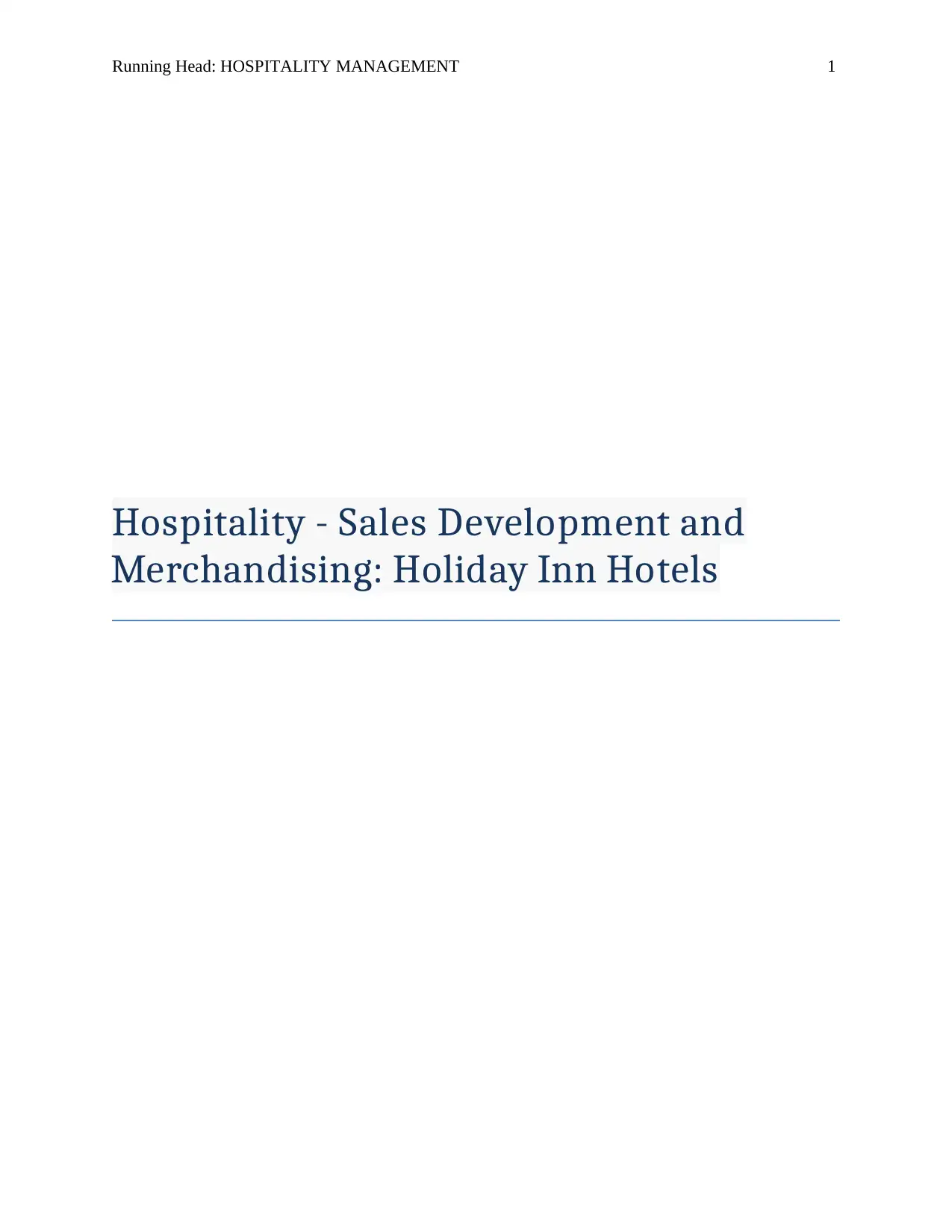
Running Head: HOSPITALITY MANAGEMENT 1
Hospitality - Sales Development and
Merchandising: Holiday Inn Hotels
Hospitality - Sales Development and
Merchandising: Holiday Inn Hotels
Secure Best Marks with AI Grader
Need help grading? Try our AI Grader for instant feedback on your assignments.
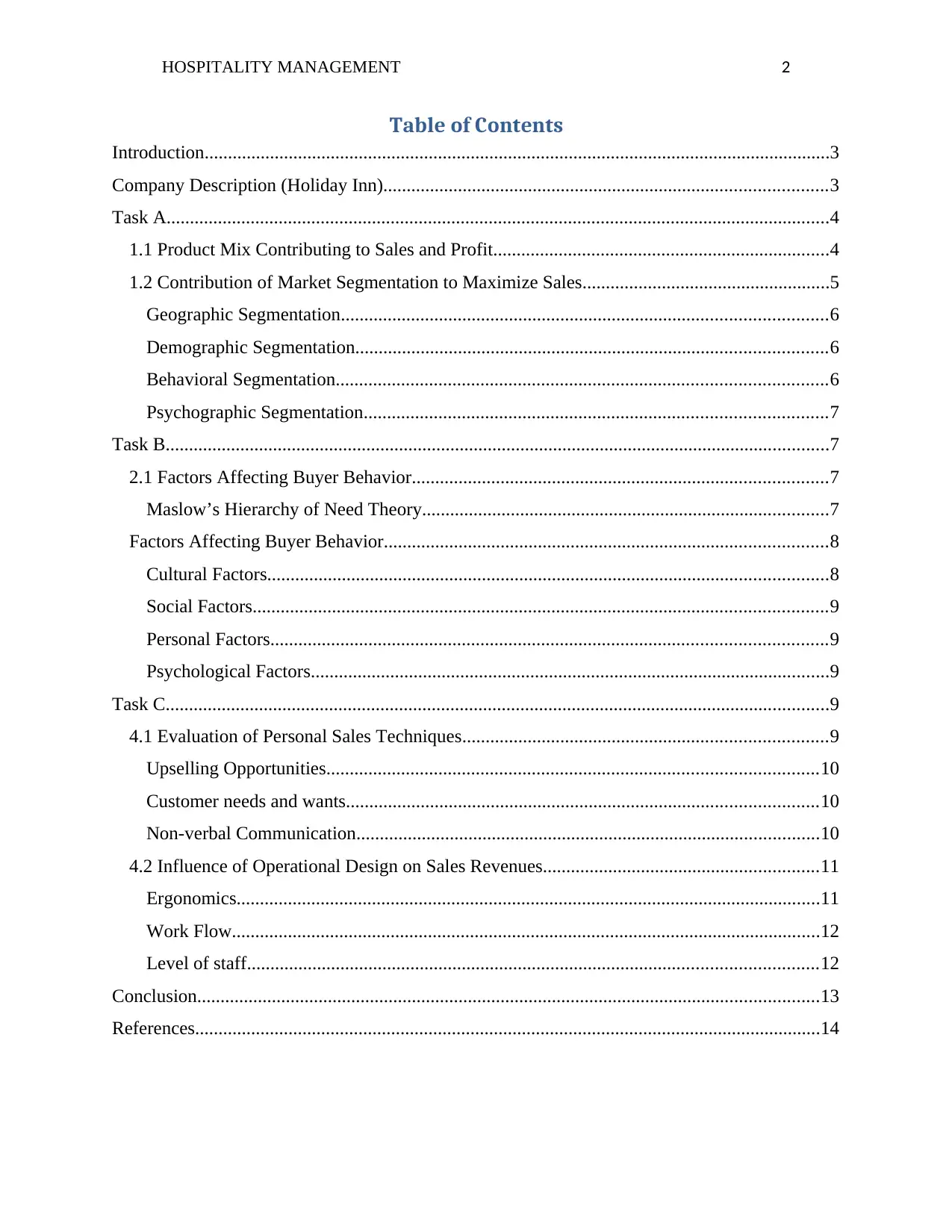
HOSPITALITY MANAGEMENT 2
Table of Contents
Introduction......................................................................................................................................3
Company Description (Holiday Inn)...............................................................................................3
Task A..............................................................................................................................................4
1.1 Product Mix Contributing to Sales and Profit........................................................................4
1.2 Contribution of Market Segmentation to Maximize Sales.....................................................5
Geographic Segmentation........................................................................................................6
Demographic Segmentation.....................................................................................................6
Behavioral Segmentation.........................................................................................................6
Psychographic Segmentation...................................................................................................7
Task B..............................................................................................................................................7
2.1 Factors Affecting Buyer Behavior.........................................................................................7
Maslow’s Hierarchy of Need Theory.......................................................................................7
Factors Affecting Buyer Behavior...............................................................................................8
Cultural Factors........................................................................................................................8
Social Factors...........................................................................................................................9
Personal Factors.......................................................................................................................9
Psychological Factors...............................................................................................................9
Task C..............................................................................................................................................9
4.1 Evaluation of Personal Sales Techniques..............................................................................9
Upselling Opportunities.........................................................................................................10
Customer needs and wants.....................................................................................................10
Non-verbal Communication...................................................................................................10
4.2 Influence of Operational Design on Sales Revenues...........................................................11
Ergonomics.............................................................................................................................11
Work Flow..............................................................................................................................12
Level of staff..........................................................................................................................12
Conclusion.....................................................................................................................................13
References......................................................................................................................................14
Table of Contents
Introduction......................................................................................................................................3
Company Description (Holiday Inn)...............................................................................................3
Task A..............................................................................................................................................4
1.1 Product Mix Contributing to Sales and Profit........................................................................4
1.2 Contribution of Market Segmentation to Maximize Sales.....................................................5
Geographic Segmentation........................................................................................................6
Demographic Segmentation.....................................................................................................6
Behavioral Segmentation.........................................................................................................6
Psychographic Segmentation...................................................................................................7
Task B..............................................................................................................................................7
2.1 Factors Affecting Buyer Behavior.........................................................................................7
Maslow’s Hierarchy of Need Theory.......................................................................................7
Factors Affecting Buyer Behavior...............................................................................................8
Cultural Factors........................................................................................................................8
Social Factors...........................................................................................................................9
Personal Factors.......................................................................................................................9
Psychological Factors...............................................................................................................9
Task C..............................................................................................................................................9
4.1 Evaluation of Personal Sales Techniques..............................................................................9
Upselling Opportunities.........................................................................................................10
Customer needs and wants.....................................................................................................10
Non-verbal Communication...................................................................................................10
4.2 Influence of Operational Design on Sales Revenues...........................................................11
Ergonomics.............................................................................................................................11
Work Flow..............................................................................................................................12
Level of staff..........................................................................................................................12
Conclusion.....................................................................................................................................13
References......................................................................................................................................14
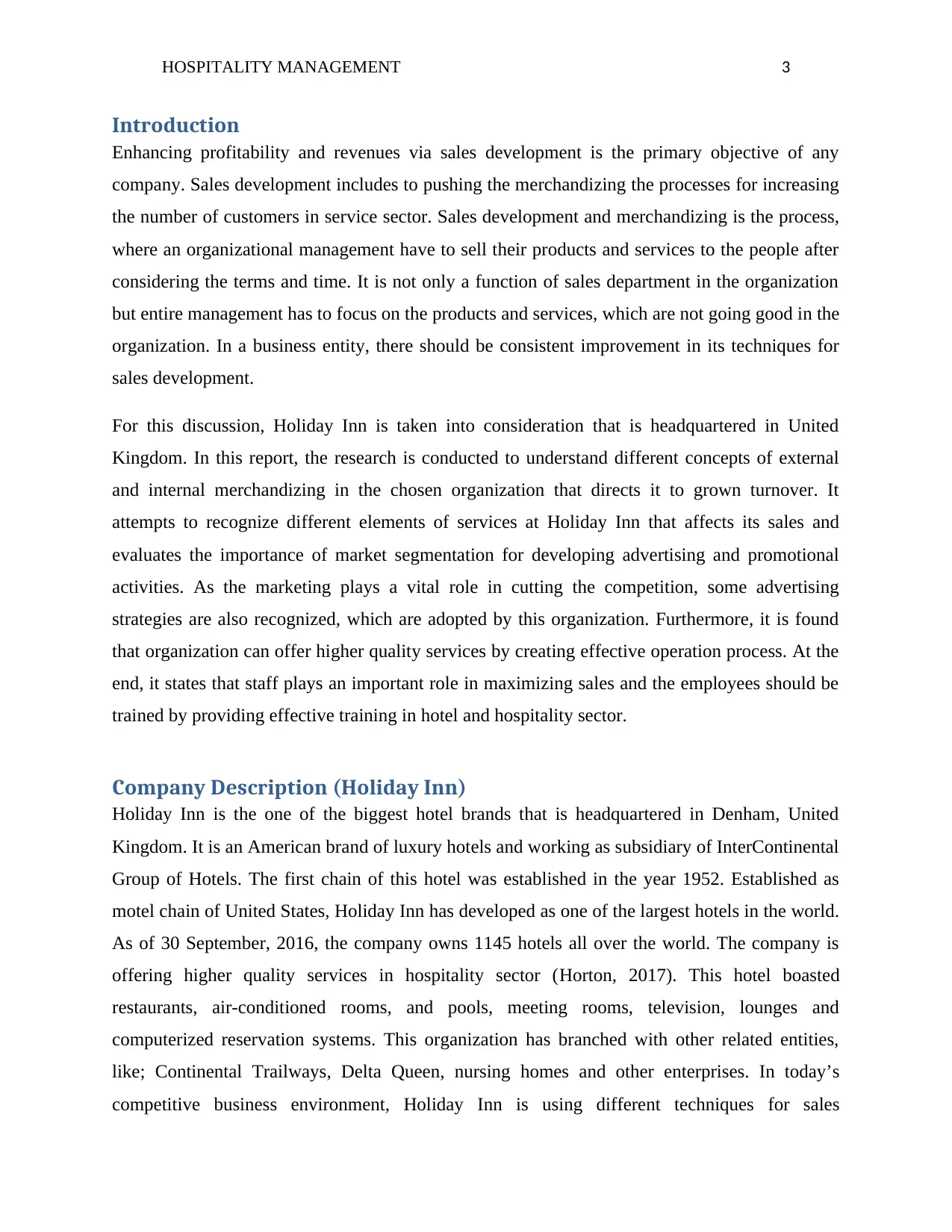
HOSPITALITY MANAGEMENT 3
Introduction
Enhancing profitability and revenues via sales development is the primary objective of any
company. Sales development includes to pushing the merchandizing the processes for increasing
the number of customers in service sector. Sales development and merchandizing is the process,
where an organizational management have to sell their products and services to the people after
considering the terms and time. It is not only a function of sales department in the organization
but entire management has to focus on the products and services, which are not going good in the
organization. In a business entity, there should be consistent improvement in its techniques for
sales development.
For this discussion, Holiday Inn is taken into consideration that is headquartered in United
Kingdom. In this report, the research is conducted to understand different concepts of external
and internal merchandizing in the chosen organization that directs it to grown turnover. It
attempts to recognize different elements of services at Holiday Inn that affects its sales and
evaluates the importance of market segmentation for developing advertising and promotional
activities. As the marketing plays a vital role in cutting the competition, some advertising
strategies are also recognized, which are adopted by this organization. Furthermore, it is found
that organization can offer higher quality services by creating effective operation process. At the
end, it states that staff plays an important role in maximizing sales and the employees should be
trained by providing effective training in hotel and hospitality sector.
Company Description (Holiday Inn)
Holiday Inn is the one of the biggest hotel brands that is headquartered in Denham, United
Kingdom. It is an American brand of luxury hotels and working as subsidiary of InterContinental
Group of Hotels. The first chain of this hotel was established in the year 1952. Established as
motel chain of United States, Holiday Inn has developed as one of the largest hotels in the world.
As of 30 September, 2016, the company owns 1145 hotels all over the world. The company is
offering higher quality services in hospitality sector (Horton, 2017). This hotel boasted
restaurants, air-conditioned rooms, and pools, meeting rooms, television, lounges and
computerized reservation systems. This organization has branched with other related entities,
like; Continental Trailways, Delta Queen, nursing homes and other enterprises. In today’s
competitive business environment, Holiday Inn is using different techniques for sales
Introduction
Enhancing profitability and revenues via sales development is the primary objective of any
company. Sales development includes to pushing the merchandizing the processes for increasing
the number of customers in service sector. Sales development and merchandizing is the process,
where an organizational management have to sell their products and services to the people after
considering the terms and time. It is not only a function of sales department in the organization
but entire management has to focus on the products and services, which are not going good in the
organization. In a business entity, there should be consistent improvement in its techniques for
sales development.
For this discussion, Holiday Inn is taken into consideration that is headquartered in United
Kingdom. In this report, the research is conducted to understand different concepts of external
and internal merchandizing in the chosen organization that directs it to grown turnover. It
attempts to recognize different elements of services at Holiday Inn that affects its sales and
evaluates the importance of market segmentation for developing advertising and promotional
activities. As the marketing plays a vital role in cutting the competition, some advertising
strategies are also recognized, which are adopted by this organization. Furthermore, it is found
that organization can offer higher quality services by creating effective operation process. At the
end, it states that staff plays an important role in maximizing sales and the employees should be
trained by providing effective training in hotel and hospitality sector.
Company Description (Holiday Inn)
Holiday Inn is the one of the biggest hotel brands that is headquartered in Denham, United
Kingdom. It is an American brand of luxury hotels and working as subsidiary of InterContinental
Group of Hotels. The first chain of this hotel was established in the year 1952. Established as
motel chain of United States, Holiday Inn has developed as one of the largest hotels in the world.
As of 30 September, 2016, the company owns 1145 hotels all over the world. The company is
offering higher quality services in hospitality sector (Horton, 2017). This hotel boasted
restaurants, air-conditioned rooms, and pools, meeting rooms, television, lounges and
computerized reservation systems. This organization has branched with other related entities,
like; Continental Trailways, Delta Queen, nursing homes and other enterprises. In today’s
competitive business environment, Holiday Inn is using different techniques for sales
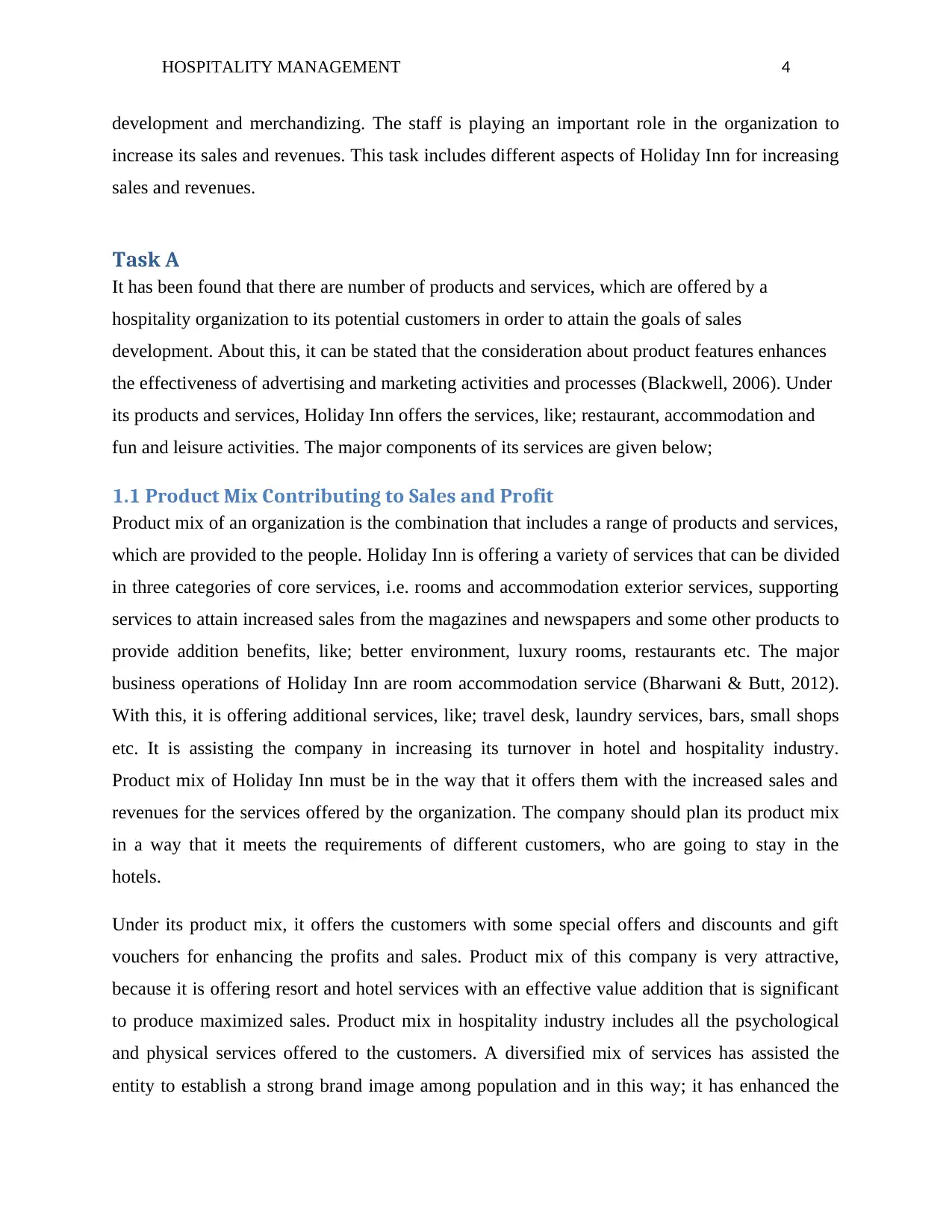
HOSPITALITY MANAGEMENT 4
development and merchandizing. The staff is playing an important role in the organization to
increase its sales and revenues. This task includes different aspects of Holiday Inn for increasing
sales and revenues.
Task A
It has been found that there are number of products and services, which are offered by a
hospitality organization to its potential customers in order to attain the goals of sales
development. About this, it can be stated that the consideration about product features enhances
the effectiveness of advertising and marketing activities and processes (Blackwell, 2006). Under
its products and services, Holiday Inn offers the services, like; restaurant, accommodation and
fun and leisure activities. The major components of its services are given below;
1.1 Product Mix Contributing to Sales and Profit
Product mix of an organization is the combination that includes a range of products and services,
which are provided to the people. Holiday Inn is offering a variety of services that can be divided
in three categories of core services, i.e. rooms and accommodation exterior services, supporting
services to attain increased sales from the magazines and newspapers and some other products to
provide addition benefits, like; better environment, luxury rooms, restaurants etc. The major
business operations of Holiday Inn are room accommodation service (Bharwani & Butt, 2012).
With this, it is offering additional services, like; travel desk, laundry services, bars, small shops
etc. It is assisting the company in increasing its turnover in hotel and hospitality industry.
Product mix of Holiday Inn must be in the way that it offers them with the increased sales and
revenues for the services offered by the organization. The company should plan its product mix
in a way that it meets the requirements of different customers, who are going to stay in the
hotels.
Under its product mix, it offers the customers with some special offers and discounts and gift
vouchers for enhancing the profits and sales. Product mix of this company is very attractive,
because it is offering resort and hotel services with an effective value addition that is significant
to produce maximized sales. Product mix in hospitality industry includes all the psychological
and physical services offered to the customers. A diversified mix of services has assisted the
entity to establish a strong brand image among population and in this way; it has enhanced the
development and merchandizing. The staff is playing an important role in the organization to
increase its sales and revenues. This task includes different aspects of Holiday Inn for increasing
sales and revenues.
Task A
It has been found that there are number of products and services, which are offered by a
hospitality organization to its potential customers in order to attain the goals of sales
development. About this, it can be stated that the consideration about product features enhances
the effectiveness of advertising and marketing activities and processes (Blackwell, 2006). Under
its products and services, Holiday Inn offers the services, like; restaurant, accommodation and
fun and leisure activities. The major components of its services are given below;
1.1 Product Mix Contributing to Sales and Profit
Product mix of an organization is the combination that includes a range of products and services,
which are provided to the people. Holiday Inn is offering a variety of services that can be divided
in three categories of core services, i.e. rooms and accommodation exterior services, supporting
services to attain increased sales from the magazines and newspapers and some other products to
provide addition benefits, like; better environment, luxury rooms, restaurants etc. The major
business operations of Holiday Inn are room accommodation service (Bharwani & Butt, 2012).
With this, it is offering additional services, like; travel desk, laundry services, bars, small shops
etc. It is assisting the company in increasing its turnover in hotel and hospitality industry.
Product mix of Holiday Inn must be in the way that it offers them with the increased sales and
revenues for the services offered by the organization. The company should plan its product mix
in a way that it meets the requirements of different customers, who are going to stay in the
hotels.
Under its product mix, it offers the customers with some special offers and discounts and gift
vouchers for enhancing the profits and sales. Product mix of this company is very attractive,
because it is offering resort and hotel services with an effective value addition that is significant
to produce maximized sales. Product mix in hospitality industry includes all the psychological
and physical services offered to the customers. A diversified mix of services has assisted the
entity to establish a strong brand image among population and in this way; it has enhanced the
Secure Best Marks with AI Grader
Need help grading? Try our AI Grader for instant feedback on your assignments.
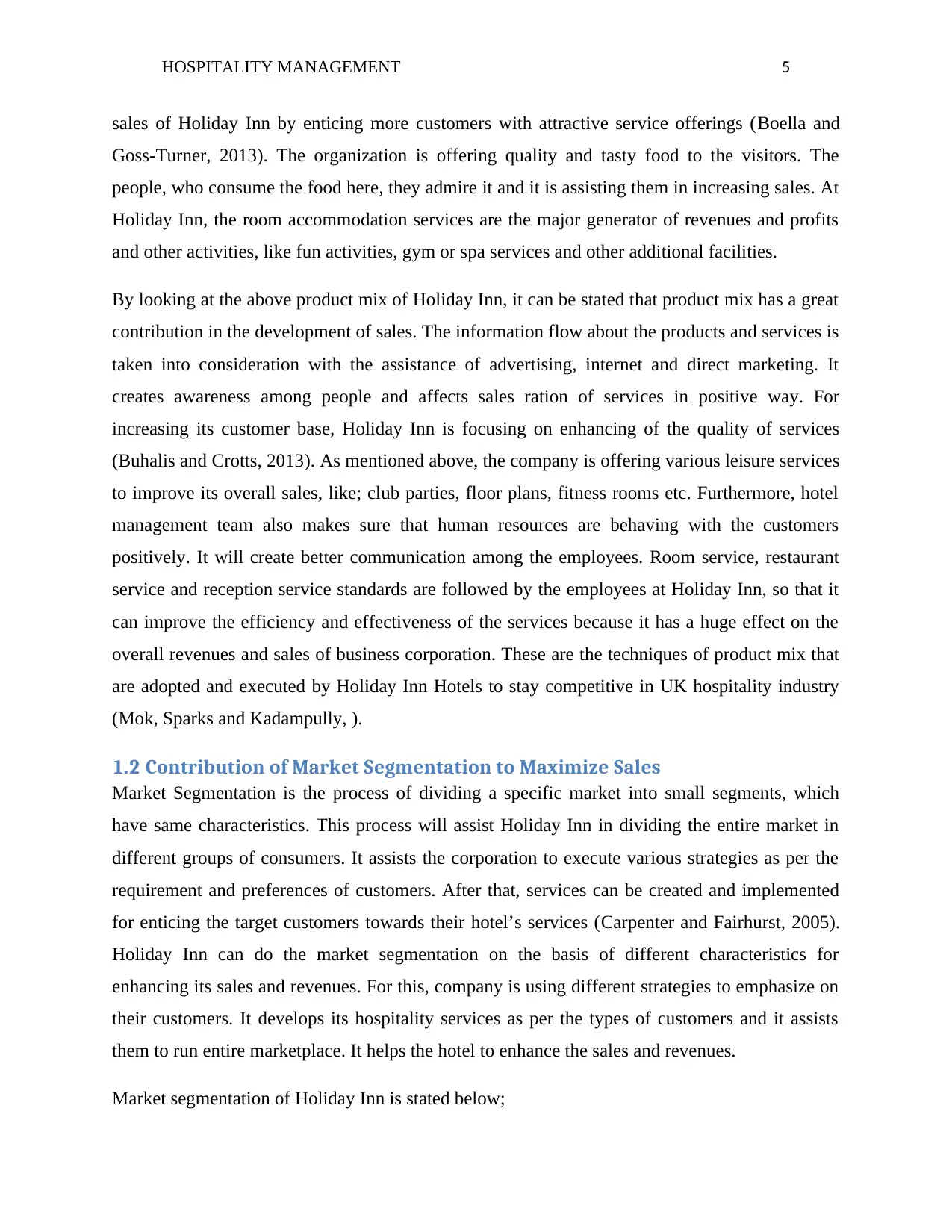
HOSPITALITY MANAGEMENT 5
sales of Holiday Inn by enticing more customers with attractive service offerings (Boella and
Goss-Turner, 2013). The organization is offering quality and tasty food to the visitors. The
people, who consume the food here, they admire it and it is assisting them in increasing sales. At
Holiday Inn, the room accommodation services are the major generator of revenues and profits
and other activities, like fun activities, gym or spa services and other additional facilities.
By looking at the above product mix of Holiday Inn, it can be stated that product mix has a great
contribution in the development of sales. The information flow about the products and services is
taken into consideration with the assistance of advertising, internet and direct marketing. It
creates awareness among people and affects sales ration of services in positive way. For
increasing its customer base, Holiday Inn is focusing on enhancing of the quality of services
(Buhalis and Crotts, 2013). As mentioned above, the company is offering various leisure services
to improve its overall sales, like; club parties, floor plans, fitness rooms etc. Furthermore, hotel
management team also makes sure that human resources are behaving with the customers
positively. It will create better communication among the employees. Room service, restaurant
service and reception service standards are followed by the employees at Holiday Inn, so that it
can improve the efficiency and effectiveness of the services because it has a huge effect on the
overall revenues and sales of business corporation. These are the techniques of product mix that
are adopted and executed by Holiday Inn Hotels to stay competitive in UK hospitality industry
(Mok, Sparks and Kadampully, ).
1.2 Contribution of Market Segmentation to Maximize Sales
Market Segmentation is the process of dividing a specific market into small segments, which
have same characteristics. This process will assist Holiday Inn in dividing the entire market in
different groups of consumers. It assists the corporation to execute various strategies as per the
requirement and preferences of customers. After that, services can be created and implemented
for enticing the target customers towards their hotel’s services (Carpenter and Fairhurst, 2005).
Holiday Inn can do the market segmentation on the basis of different characteristics for
enhancing its sales and revenues. For this, company is using different strategies to emphasize on
their customers. It develops its hospitality services as per the types of customers and it assists
them to run entire marketplace. It helps the hotel to enhance the sales and revenues.
Market segmentation of Holiday Inn is stated below;
sales of Holiday Inn by enticing more customers with attractive service offerings (Boella and
Goss-Turner, 2013). The organization is offering quality and tasty food to the visitors. The
people, who consume the food here, they admire it and it is assisting them in increasing sales. At
Holiday Inn, the room accommodation services are the major generator of revenues and profits
and other activities, like fun activities, gym or spa services and other additional facilities.
By looking at the above product mix of Holiday Inn, it can be stated that product mix has a great
contribution in the development of sales. The information flow about the products and services is
taken into consideration with the assistance of advertising, internet and direct marketing. It
creates awareness among people and affects sales ration of services in positive way. For
increasing its customer base, Holiday Inn is focusing on enhancing of the quality of services
(Buhalis and Crotts, 2013). As mentioned above, the company is offering various leisure services
to improve its overall sales, like; club parties, floor plans, fitness rooms etc. Furthermore, hotel
management team also makes sure that human resources are behaving with the customers
positively. It will create better communication among the employees. Room service, restaurant
service and reception service standards are followed by the employees at Holiday Inn, so that it
can improve the efficiency and effectiveness of the services because it has a huge effect on the
overall revenues and sales of business corporation. These are the techniques of product mix that
are adopted and executed by Holiday Inn Hotels to stay competitive in UK hospitality industry
(Mok, Sparks and Kadampully, ).
1.2 Contribution of Market Segmentation to Maximize Sales
Market Segmentation is the process of dividing a specific market into small segments, which
have same characteristics. This process will assist Holiday Inn in dividing the entire market in
different groups of consumers. It assists the corporation to execute various strategies as per the
requirement and preferences of customers. After that, services can be created and implemented
for enticing the target customers towards their hotel’s services (Carpenter and Fairhurst, 2005).
Holiday Inn can do the market segmentation on the basis of different characteristics for
enhancing its sales and revenues. For this, company is using different strategies to emphasize on
their customers. It develops its hospitality services as per the types of customers and it assists
them to run entire marketplace. It helps the hotel to enhance the sales and revenues.
Market segmentation of Holiday Inn is stated below;
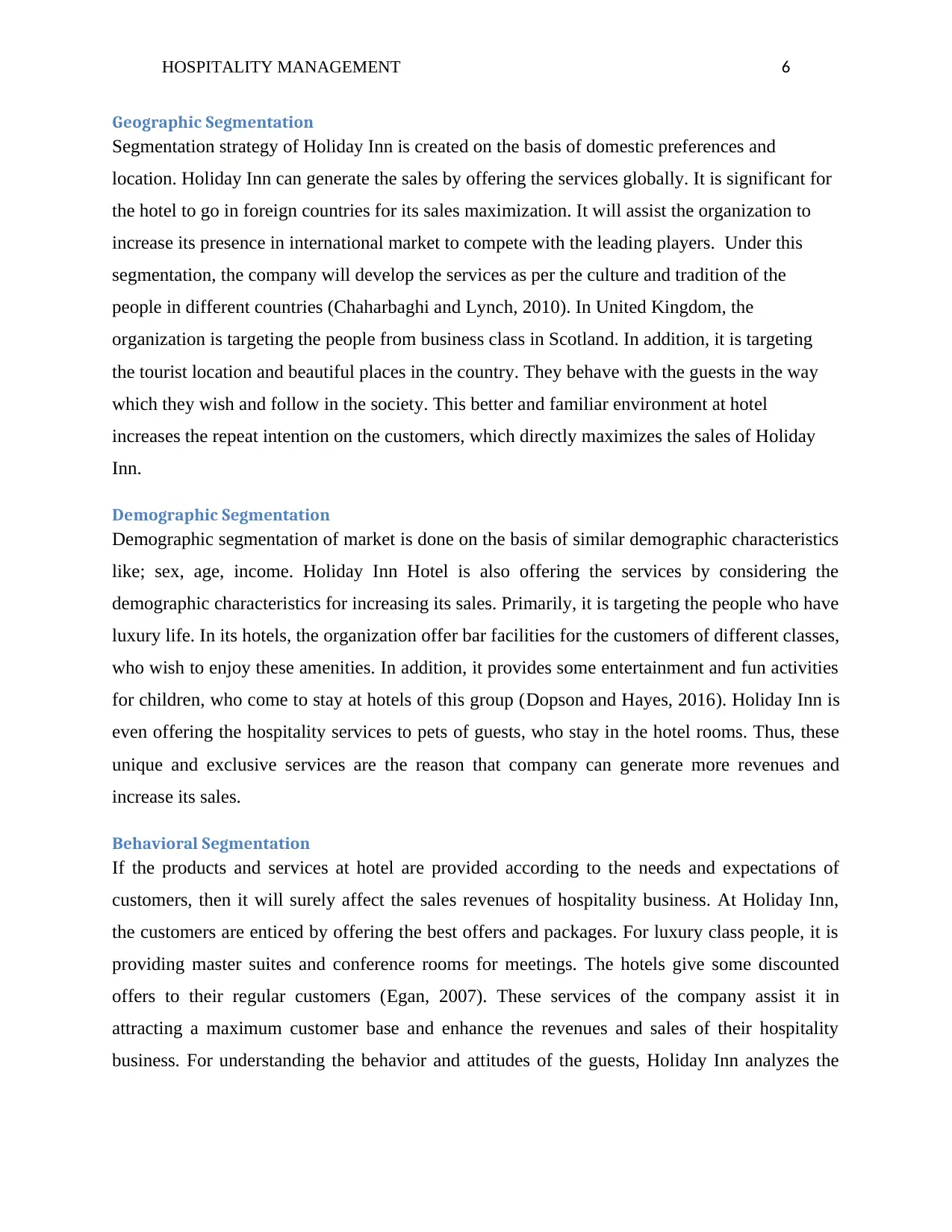
HOSPITALITY MANAGEMENT 6
Geographic Segmentation
Segmentation strategy of Holiday Inn is created on the basis of domestic preferences and
location. Holiday Inn can generate the sales by offering the services globally. It is significant for
the hotel to go in foreign countries for its sales maximization. It will assist the organization to
increase its presence in international market to compete with the leading players. Under this
segmentation, the company will develop the services as per the culture and tradition of the
people in different countries (Chaharbaghi and Lynch, 2010). In United Kingdom, the
organization is targeting the people from business class in Scotland. In addition, it is targeting
the tourist location and beautiful places in the country. They behave with the guests in the way
which they wish and follow in the society. This better and familiar environment at hotel
increases the repeat intention on the customers, which directly maximizes the sales of Holiday
Inn.
Demographic Segmentation
Demographic segmentation of market is done on the basis of similar demographic characteristics
like; sex, age, income. Holiday Inn Hotel is also offering the services by considering the
demographic characteristics for increasing its sales. Primarily, it is targeting the people who have
luxury life. In its hotels, the organization offer bar facilities for the customers of different classes,
who wish to enjoy these amenities. In addition, it provides some entertainment and fun activities
for children, who come to stay at hotels of this group (Dopson and Hayes, 2016). Holiday Inn is
even offering the hospitality services to pets of guests, who stay in the hotel rooms. Thus, these
unique and exclusive services are the reason that company can generate more revenues and
increase its sales.
Behavioral Segmentation
If the products and services at hotel are provided according to the needs and expectations of
customers, then it will surely affect the sales revenues of hospitality business. At Holiday Inn,
the customers are enticed by offering the best offers and packages. For luxury class people, it is
providing master suites and conference rooms for meetings. The hotels give some discounted
offers to their regular customers (Egan, 2007). These services of the company assist it in
attracting a maximum customer base and enhance the revenues and sales of their hospitality
business. For understanding the behavior and attitudes of the guests, Holiday Inn analyzes the
Geographic Segmentation
Segmentation strategy of Holiday Inn is created on the basis of domestic preferences and
location. Holiday Inn can generate the sales by offering the services globally. It is significant for
the hotel to go in foreign countries for its sales maximization. It will assist the organization to
increase its presence in international market to compete with the leading players. Under this
segmentation, the company will develop the services as per the culture and tradition of the
people in different countries (Chaharbaghi and Lynch, 2010). In United Kingdom, the
organization is targeting the people from business class in Scotland. In addition, it is targeting
the tourist location and beautiful places in the country. They behave with the guests in the way
which they wish and follow in the society. This better and familiar environment at hotel
increases the repeat intention on the customers, which directly maximizes the sales of Holiday
Inn.
Demographic Segmentation
Demographic segmentation of market is done on the basis of similar demographic characteristics
like; sex, age, income. Holiday Inn Hotel is also offering the services by considering the
demographic characteristics for increasing its sales. Primarily, it is targeting the people who have
luxury life. In its hotels, the organization offer bar facilities for the customers of different classes,
who wish to enjoy these amenities. In addition, it provides some entertainment and fun activities
for children, who come to stay at hotels of this group (Dopson and Hayes, 2016). Holiday Inn is
even offering the hospitality services to pets of guests, who stay in the hotel rooms. Thus, these
unique and exclusive services are the reason that company can generate more revenues and
increase its sales.
Behavioral Segmentation
If the products and services at hotel are provided according to the needs and expectations of
customers, then it will surely affect the sales revenues of hospitality business. At Holiday Inn,
the customers are enticed by offering the best offers and packages. For luxury class people, it is
providing master suites and conference rooms for meetings. The hotels give some discounted
offers to their regular customers (Egan, 2007). These services of the company assist it in
attracting a maximum customer base and enhance the revenues and sales of their hospitality
business. For understanding the behavior and attitudes of the guests, Holiday Inn analyzes the
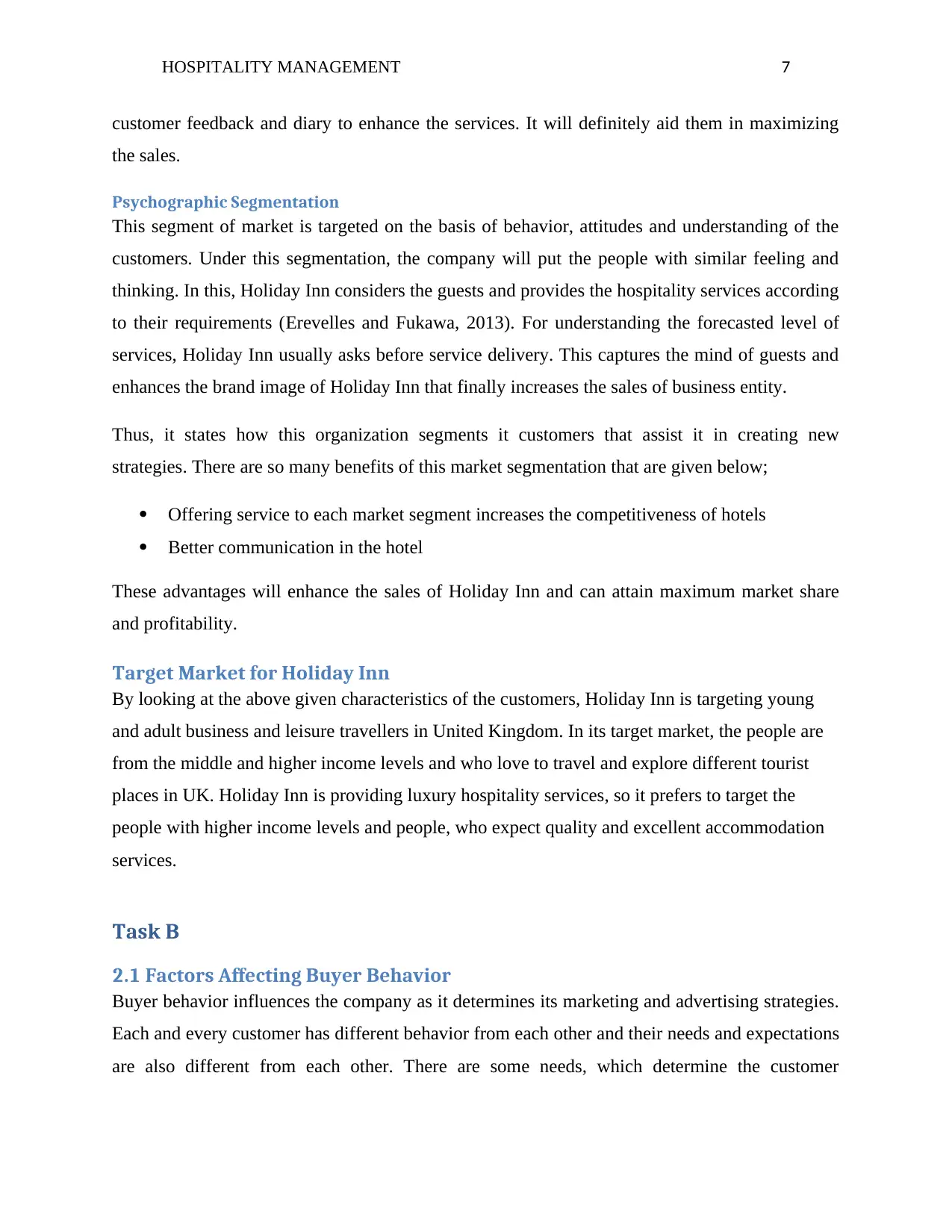
HOSPITALITY MANAGEMENT 7
customer feedback and diary to enhance the services. It will definitely aid them in maximizing
the sales.
Psychographic Segmentation
This segment of market is targeted on the basis of behavior, attitudes and understanding of the
customers. Under this segmentation, the company will put the people with similar feeling and
thinking. In this, Holiday Inn considers the guests and provides the hospitality services according
to their requirements (Erevelles and Fukawa, 2013). For understanding the forecasted level of
services, Holiday Inn usually asks before service delivery. This captures the mind of guests and
enhances the brand image of Holiday Inn that finally increases the sales of business entity.
Thus, it states how this organization segments it customers that assist it in creating new
strategies. There are so many benefits of this market segmentation that are given below;
Offering service to each market segment increases the competitiveness of hotels
Better communication in the hotel
These advantages will enhance the sales of Holiday Inn and can attain maximum market share
and profitability.
Target Market for Holiday Inn
By looking at the above given characteristics of the customers, Holiday Inn is targeting young
and adult business and leisure travellers in United Kingdom. In its target market, the people are
from the middle and higher income levels and who love to travel and explore different tourist
places in UK. Holiday Inn is providing luxury hospitality services, so it prefers to target the
people with higher income levels and people, who expect quality and excellent accommodation
services.
Task B
2.1 Factors Affecting Buyer Behavior
Buyer behavior influences the company as it determines its marketing and advertising strategies.
Each and every customer has different behavior from each other and their needs and expectations
are also different from each other. There are some needs, which determine the customer
customer feedback and diary to enhance the services. It will definitely aid them in maximizing
the sales.
Psychographic Segmentation
This segment of market is targeted on the basis of behavior, attitudes and understanding of the
customers. Under this segmentation, the company will put the people with similar feeling and
thinking. In this, Holiday Inn considers the guests and provides the hospitality services according
to their requirements (Erevelles and Fukawa, 2013). For understanding the forecasted level of
services, Holiday Inn usually asks before service delivery. This captures the mind of guests and
enhances the brand image of Holiday Inn that finally increases the sales of business entity.
Thus, it states how this organization segments it customers that assist it in creating new
strategies. There are so many benefits of this market segmentation that are given below;
Offering service to each market segment increases the competitiveness of hotels
Better communication in the hotel
These advantages will enhance the sales of Holiday Inn and can attain maximum market share
and profitability.
Target Market for Holiday Inn
By looking at the above given characteristics of the customers, Holiday Inn is targeting young
and adult business and leisure travellers in United Kingdom. In its target market, the people are
from the middle and higher income levels and who love to travel and explore different tourist
places in UK. Holiday Inn is providing luxury hospitality services, so it prefers to target the
people with higher income levels and people, who expect quality and excellent accommodation
services.
Task B
2.1 Factors Affecting Buyer Behavior
Buyer behavior influences the company as it determines its marketing and advertising strategies.
Each and every customer has different behavior from each other and their needs and expectations
are also different from each other. There are some needs, which determine the customer
Paraphrase This Document
Need a fresh take? Get an instant paraphrase of this document with our AI Paraphraser
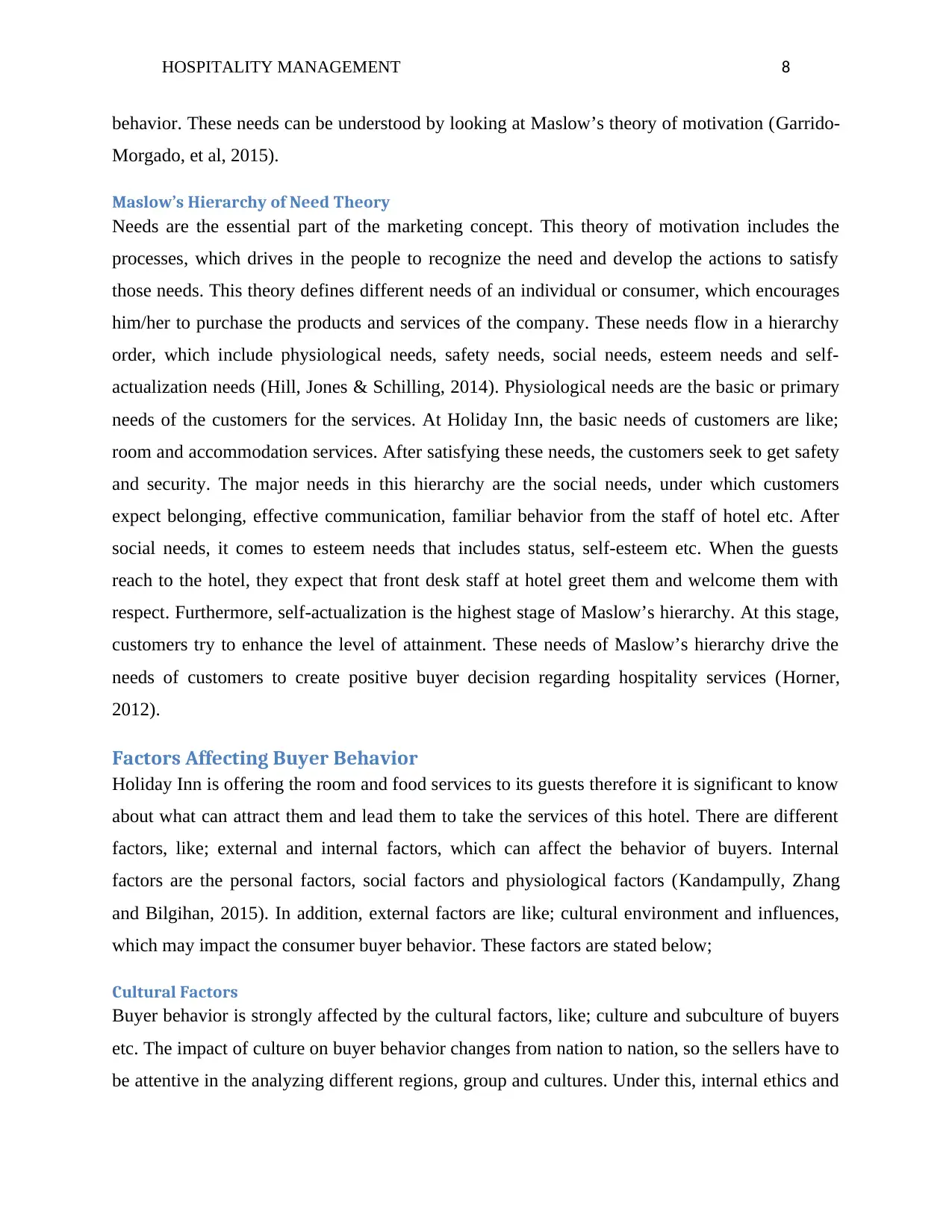
HOSPITALITY MANAGEMENT 8
behavior. These needs can be understood by looking at Maslow’s theory of motivation (Garrido-
Morgado, et al, 2015).
Maslow’s Hierarchy of Need Theory
Needs are the essential part of the marketing concept. This theory of motivation includes the
processes, which drives in the people to recognize the need and develop the actions to satisfy
those needs. This theory defines different needs of an individual or consumer, which encourages
him/her to purchase the products and services of the company. These needs flow in a hierarchy
order, which include physiological needs, safety needs, social needs, esteem needs and self-
actualization needs (Hill, Jones & Schilling, 2014). Physiological needs are the basic or primary
needs of the customers for the services. At Holiday Inn, the basic needs of customers are like;
room and accommodation services. After satisfying these needs, the customers seek to get safety
and security. The major needs in this hierarchy are the social needs, under which customers
expect belonging, effective communication, familiar behavior from the staff of hotel etc. After
social needs, it comes to esteem needs that includes status, self-esteem etc. When the guests
reach to the hotel, they expect that front desk staff at hotel greet them and welcome them with
respect. Furthermore, self-actualization is the highest stage of Maslow’s hierarchy. At this stage,
customers try to enhance the level of attainment. These needs of Maslow’s hierarchy drive the
needs of customers to create positive buyer decision regarding hospitality services (Horner,
2012).
Factors Affecting Buyer Behavior
Holiday Inn is offering the room and food services to its guests therefore it is significant to know
about what can attract them and lead them to take the services of this hotel. There are different
factors, like; external and internal factors, which can affect the behavior of buyers. Internal
factors are the personal factors, social factors and physiological factors (Kandampully, Zhang
and Bilgihan, 2015). In addition, external factors are like; cultural environment and influences,
which may impact the consumer buyer behavior. These factors are stated below;
Cultural Factors
Buyer behavior is strongly affected by the cultural factors, like; culture and subculture of buyers
etc. The impact of culture on buyer behavior changes from nation to nation, so the sellers have to
be attentive in the analyzing different regions, group and cultures. Under this, internal ethics and
behavior. These needs can be understood by looking at Maslow’s theory of motivation (Garrido-
Morgado, et al, 2015).
Maslow’s Hierarchy of Need Theory
Needs are the essential part of the marketing concept. This theory of motivation includes the
processes, which drives in the people to recognize the need and develop the actions to satisfy
those needs. This theory defines different needs of an individual or consumer, which encourages
him/her to purchase the products and services of the company. These needs flow in a hierarchy
order, which include physiological needs, safety needs, social needs, esteem needs and self-
actualization needs (Hill, Jones & Schilling, 2014). Physiological needs are the basic or primary
needs of the customers for the services. At Holiday Inn, the basic needs of customers are like;
room and accommodation services. After satisfying these needs, the customers seek to get safety
and security. The major needs in this hierarchy are the social needs, under which customers
expect belonging, effective communication, familiar behavior from the staff of hotel etc. After
social needs, it comes to esteem needs that includes status, self-esteem etc. When the guests
reach to the hotel, they expect that front desk staff at hotel greet them and welcome them with
respect. Furthermore, self-actualization is the highest stage of Maslow’s hierarchy. At this stage,
customers try to enhance the level of attainment. These needs of Maslow’s hierarchy drive the
needs of customers to create positive buyer decision regarding hospitality services (Horner,
2012).
Factors Affecting Buyer Behavior
Holiday Inn is offering the room and food services to its guests therefore it is significant to know
about what can attract them and lead them to take the services of this hotel. There are different
factors, like; external and internal factors, which can affect the behavior of buyers. Internal
factors are the personal factors, social factors and physiological factors (Kandampully, Zhang
and Bilgihan, 2015). In addition, external factors are like; cultural environment and influences,
which may impact the consumer buyer behavior. These factors are stated below;
Cultural Factors
Buyer behavior is strongly affected by the cultural factors, like; culture and subculture of buyers
etc. The impact of culture on buyer behavior changes from nation to nation, so the sellers have to
be attentive in the analyzing different regions, group and cultures. Under this, internal ethics and
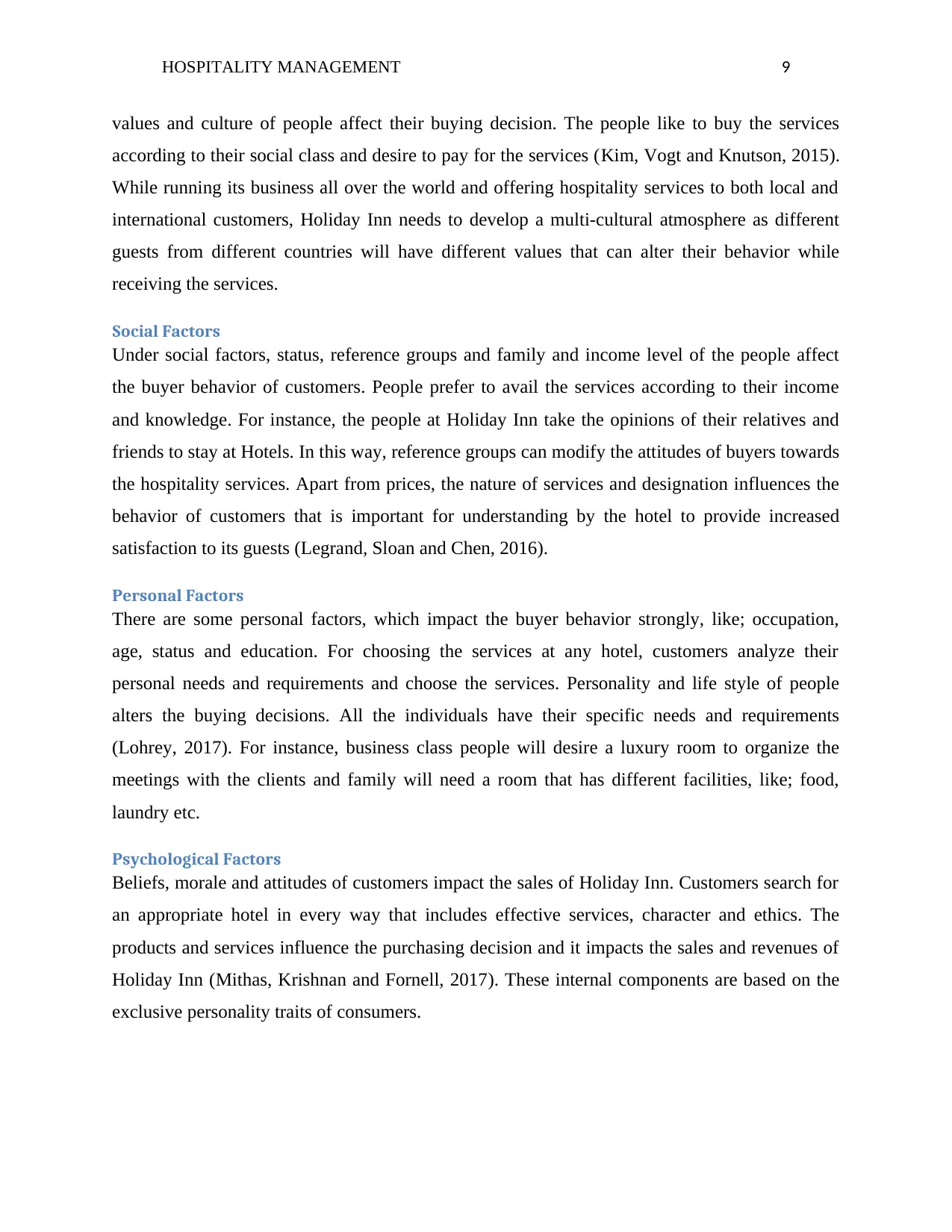
HOSPITALITY MANAGEMENT 9
values and culture of people affect their buying decision. The people like to buy the services
according to their social class and desire to pay for the services (Kim, Vogt and Knutson, 2015).
While running its business all over the world and offering hospitality services to both local and
international customers, Holiday Inn needs to develop a multi-cultural atmosphere as different
guests from different countries will have different values that can alter their behavior while
receiving the services.
Social Factors
Under social factors, status, reference groups and family and income level of the people affect
the buyer behavior of customers. People prefer to avail the services according to their income
and knowledge. For instance, the people at Holiday Inn take the opinions of their relatives and
friends to stay at Hotels. In this way, reference groups can modify the attitudes of buyers towards
the hospitality services. Apart from prices, the nature of services and designation influences the
behavior of customers that is important for understanding by the hotel to provide increased
satisfaction to its guests (Legrand, Sloan and Chen, 2016).
Personal Factors
There are some personal factors, which impact the buyer behavior strongly, like; occupation,
age, status and education. For choosing the services at any hotel, customers analyze their
personal needs and requirements and choose the services. Personality and life style of people
alters the buying decisions. All the individuals have their specific needs and requirements
(Lohrey, 2017). For instance, business class people will desire a luxury room to organize the
meetings with the clients and family will need a room that has different facilities, like; food,
laundry etc.
Psychological Factors
Beliefs, morale and attitudes of customers impact the sales of Holiday Inn. Customers search for
an appropriate hotel in every way that includes effective services, character and ethics. The
products and services influence the purchasing decision and it impacts the sales and revenues of
Holiday Inn (Mithas, Krishnan and Fornell, 2017). These internal components are based on the
exclusive personality traits of consumers.
values and culture of people affect their buying decision. The people like to buy the services
according to their social class and desire to pay for the services (Kim, Vogt and Knutson, 2015).
While running its business all over the world and offering hospitality services to both local and
international customers, Holiday Inn needs to develop a multi-cultural atmosphere as different
guests from different countries will have different values that can alter their behavior while
receiving the services.
Social Factors
Under social factors, status, reference groups and family and income level of the people affect
the buyer behavior of customers. People prefer to avail the services according to their income
and knowledge. For instance, the people at Holiday Inn take the opinions of their relatives and
friends to stay at Hotels. In this way, reference groups can modify the attitudes of buyers towards
the hospitality services. Apart from prices, the nature of services and designation influences the
behavior of customers that is important for understanding by the hotel to provide increased
satisfaction to its guests (Legrand, Sloan and Chen, 2016).
Personal Factors
There are some personal factors, which impact the buyer behavior strongly, like; occupation,
age, status and education. For choosing the services at any hotel, customers analyze their
personal needs and requirements and choose the services. Personality and life style of people
alters the buying decisions. All the individuals have their specific needs and requirements
(Lohrey, 2017). For instance, business class people will desire a luxury room to organize the
meetings with the clients and family will need a room that has different facilities, like; food,
laundry etc.
Psychological Factors
Beliefs, morale and attitudes of customers impact the sales of Holiday Inn. Customers search for
an appropriate hotel in every way that includes effective services, character and ethics. The
products and services influence the purchasing decision and it impacts the sales and revenues of
Holiday Inn (Mithas, Krishnan and Fornell, 2017). These internal components are based on the
exclusive personality traits of consumers.
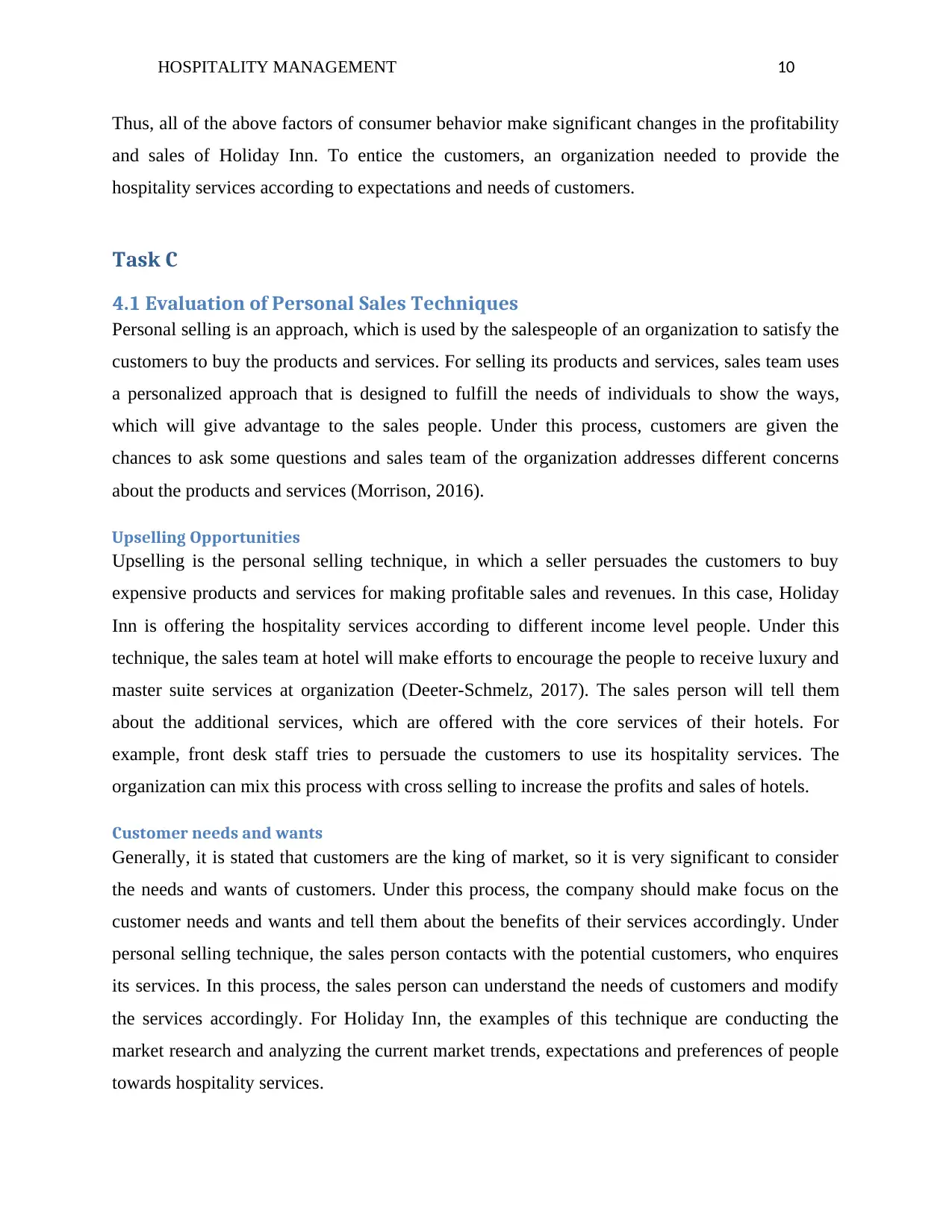
HOSPITALITY MANAGEMENT 10
Thus, all of the above factors of consumer behavior make significant changes in the profitability
and sales of Holiday Inn. To entice the customers, an organization needed to provide the
hospitality services according to expectations and needs of customers.
Task C
4.1 Evaluation of Personal Sales Techniques
Personal selling is an approach, which is used by the salespeople of an organization to satisfy the
customers to buy the products and services. For selling its products and services, sales team uses
a personalized approach that is designed to fulfill the needs of individuals to show the ways,
which will give advantage to the sales people. Under this process, customers are given the
chances to ask some questions and sales team of the organization addresses different concerns
about the products and services (Morrison, 2016).
Upselling Opportunities
Upselling is the personal selling technique, in which a seller persuades the customers to buy
expensive products and services for making profitable sales and revenues. In this case, Holiday
Inn is offering the hospitality services according to different income level people. Under this
technique, the sales team at hotel will make efforts to encourage the people to receive luxury and
master suite services at organization (Deeter-Schmelz, 2017). The sales person will tell them
about the additional services, which are offered with the core services of their hotels. For
example, front desk staff tries to persuade the customers to use its hospitality services. The
organization can mix this process with cross selling to increase the profits and sales of hotels.
Customer needs and wants
Generally, it is stated that customers are the king of market, so it is very significant to consider
the needs and wants of customers. Under this process, the company should make focus on the
customer needs and wants and tell them about the benefits of their services accordingly. Under
personal selling technique, the sales person contacts with the potential customers, who enquires
its services. In this process, the sales person can understand the needs of customers and modify
the services accordingly. For Holiday Inn, the examples of this technique are conducting the
market research and analyzing the current market trends, expectations and preferences of people
towards hospitality services.
Thus, all of the above factors of consumer behavior make significant changes in the profitability
and sales of Holiday Inn. To entice the customers, an organization needed to provide the
hospitality services according to expectations and needs of customers.
Task C
4.1 Evaluation of Personal Sales Techniques
Personal selling is an approach, which is used by the salespeople of an organization to satisfy the
customers to buy the products and services. For selling its products and services, sales team uses
a personalized approach that is designed to fulfill the needs of individuals to show the ways,
which will give advantage to the sales people. Under this process, customers are given the
chances to ask some questions and sales team of the organization addresses different concerns
about the products and services (Morrison, 2016).
Upselling Opportunities
Upselling is the personal selling technique, in which a seller persuades the customers to buy
expensive products and services for making profitable sales and revenues. In this case, Holiday
Inn is offering the hospitality services according to different income level people. Under this
technique, the sales team at hotel will make efforts to encourage the people to receive luxury and
master suite services at organization (Deeter-Schmelz, 2017). The sales person will tell them
about the additional services, which are offered with the core services of their hotels. For
example, front desk staff tries to persuade the customers to use its hospitality services. The
organization can mix this process with cross selling to increase the profits and sales of hotels.
Customer needs and wants
Generally, it is stated that customers are the king of market, so it is very significant to consider
the needs and wants of customers. Under this process, the company should make focus on the
customer needs and wants and tell them about the benefits of their services accordingly. Under
personal selling technique, the sales person contacts with the potential customers, who enquires
its services. In this process, the sales person can understand the needs of customers and modify
the services accordingly. For Holiday Inn, the examples of this technique are conducting the
market research and analyzing the current market trends, expectations and preferences of people
towards hospitality services.
Secure Best Marks with AI Grader
Need help grading? Try our AI Grader for instant feedback on your assignments.
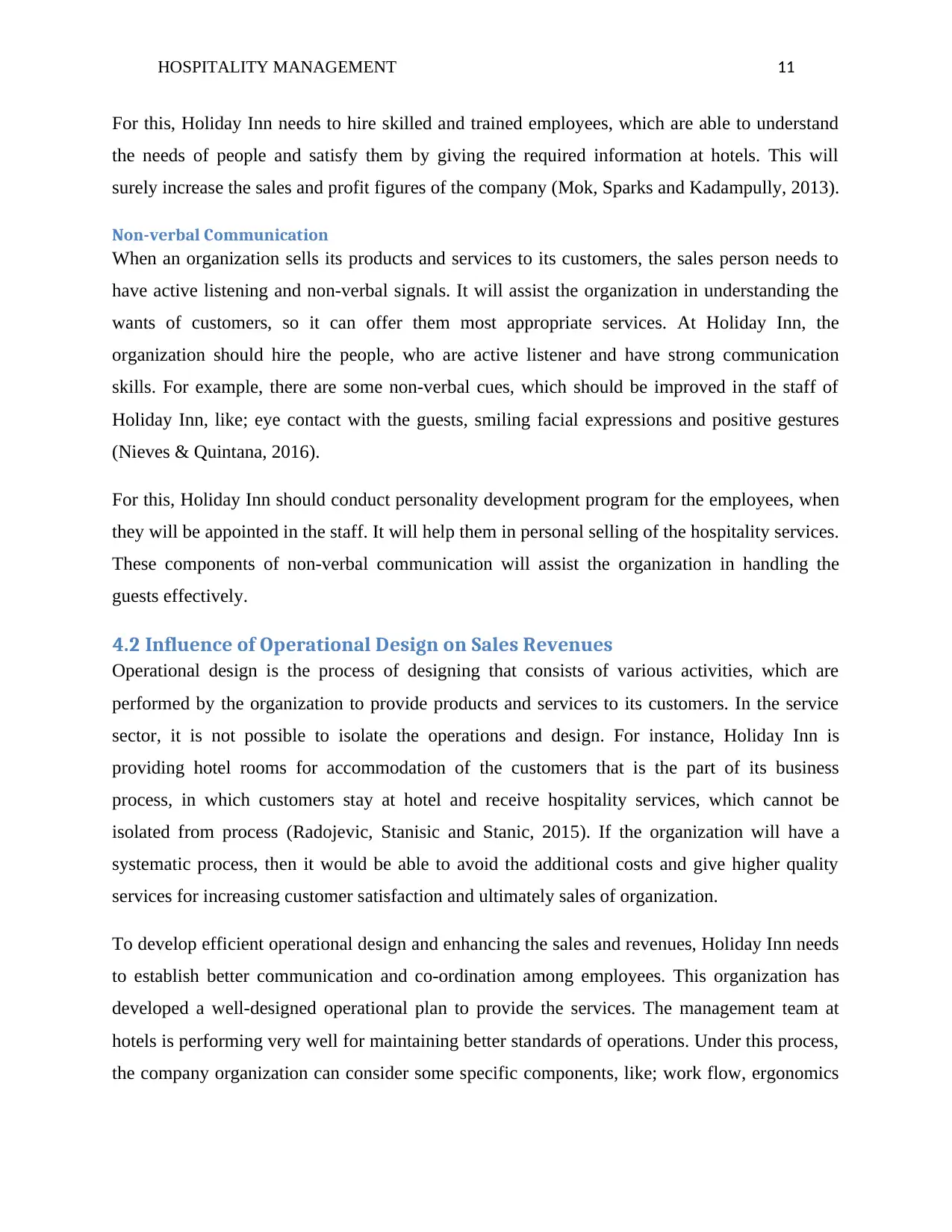
HOSPITALITY MANAGEMENT 11
For this, Holiday Inn needs to hire skilled and trained employees, which are able to understand
the needs of people and satisfy them by giving the required information at hotels. This will
surely increase the sales and profit figures of the company (Mok, Sparks and Kadampully, 2013).
Non-verbal Communication
When an organization sells its products and services to its customers, the sales person needs to
have active listening and non-verbal signals. It will assist the organization in understanding the
wants of customers, so it can offer them most appropriate services. At Holiday Inn, the
organization should hire the people, who are active listener and have strong communication
skills. For example, there are some non-verbal cues, which should be improved in the staff of
Holiday Inn, like; eye contact with the guests, smiling facial expressions and positive gestures
(Nieves & Quintana, 2016).
For this, Holiday Inn should conduct personality development program for the employees, when
they will be appointed in the staff. It will help them in personal selling of the hospitality services.
These components of non-verbal communication will assist the organization in handling the
guests effectively.
4.2 Influence of Operational Design on Sales Revenues
Operational design is the process of designing that consists of various activities, which are
performed by the organization to provide products and services to its customers. In the service
sector, it is not possible to isolate the operations and design. For instance, Holiday Inn is
providing hotel rooms for accommodation of the customers that is the part of its business
process, in which customers stay at hotel and receive hospitality services, which cannot be
isolated from process (Radojevic, Stanisic and Stanic, 2015). If the organization will have a
systematic process, then it would be able to avoid the additional costs and give higher quality
services for increasing customer satisfaction and ultimately sales of organization.
To develop efficient operational design and enhancing the sales and revenues, Holiday Inn needs
to establish better communication and co-ordination among employees. This organization has
developed a well-designed operational plan to provide the services. The management team at
hotels is performing very well for maintaining better standards of operations. Under this process,
the company organization can consider some specific components, like; work flow, ergonomics
For this, Holiday Inn needs to hire skilled and trained employees, which are able to understand
the needs of people and satisfy them by giving the required information at hotels. This will
surely increase the sales and profit figures of the company (Mok, Sparks and Kadampully, 2013).
Non-verbal Communication
When an organization sells its products and services to its customers, the sales person needs to
have active listening and non-verbal signals. It will assist the organization in understanding the
wants of customers, so it can offer them most appropriate services. At Holiday Inn, the
organization should hire the people, who are active listener and have strong communication
skills. For example, there are some non-verbal cues, which should be improved in the staff of
Holiday Inn, like; eye contact with the guests, smiling facial expressions and positive gestures
(Nieves & Quintana, 2016).
For this, Holiday Inn should conduct personality development program for the employees, when
they will be appointed in the staff. It will help them in personal selling of the hospitality services.
These components of non-verbal communication will assist the organization in handling the
guests effectively.
4.2 Influence of Operational Design on Sales Revenues
Operational design is the process of designing that consists of various activities, which are
performed by the organization to provide products and services to its customers. In the service
sector, it is not possible to isolate the operations and design. For instance, Holiday Inn is
providing hotel rooms for accommodation of the customers that is the part of its business
process, in which customers stay at hotel and receive hospitality services, which cannot be
isolated from process (Radojevic, Stanisic and Stanic, 2015). If the organization will have a
systematic process, then it would be able to avoid the additional costs and give higher quality
services for increasing customer satisfaction and ultimately sales of organization.
To develop efficient operational design and enhancing the sales and revenues, Holiday Inn needs
to establish better communication and co-ordination among employees. This organization has
developed a well-designed operational plan to provide the services. The management team at
hotels is performing very well for maintaining better standards of operations. Under this process,
the company organization can consider some specific components, like; work flow, ergonomics
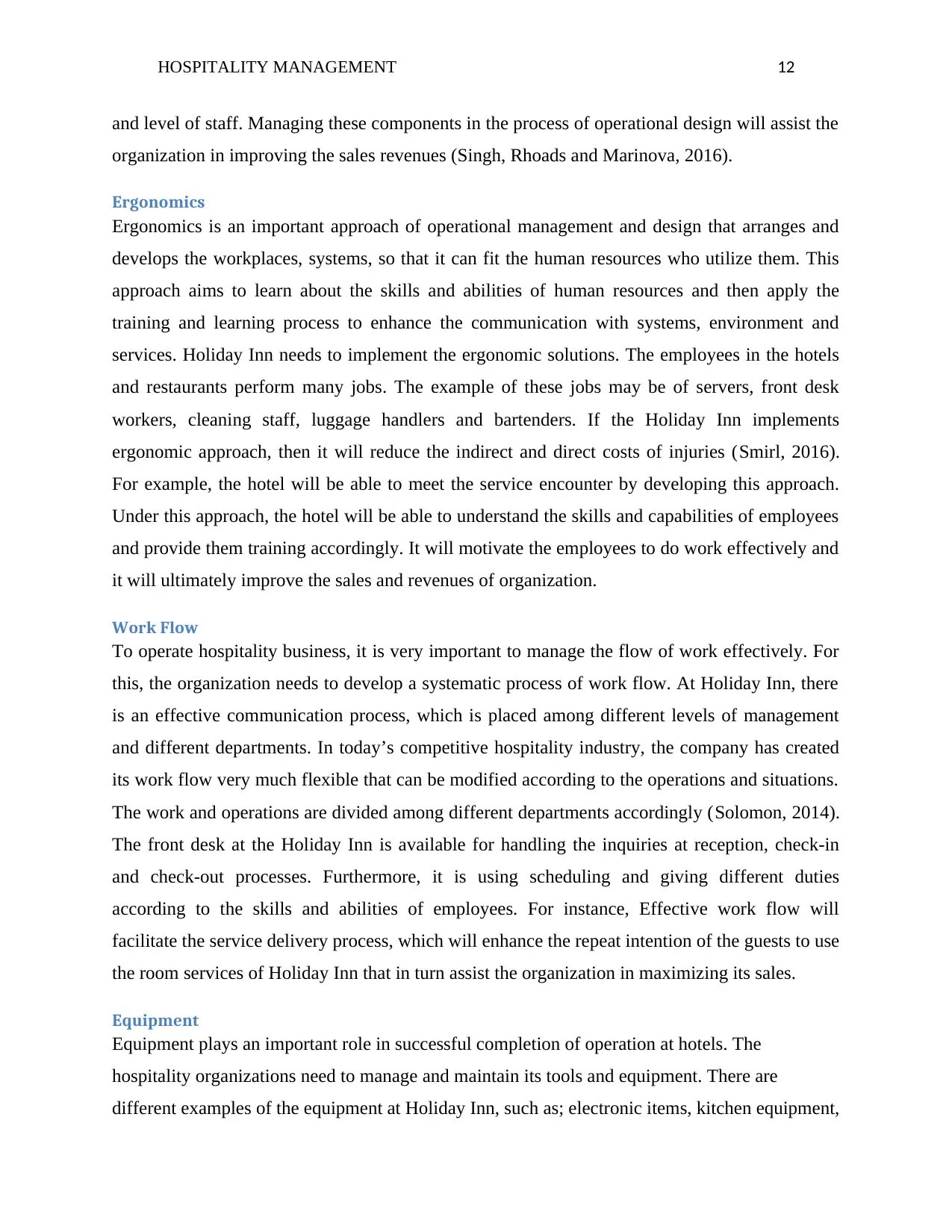
HOSPITALITY MANAGEMENT 12
and level of staff. Managing these components in the process of operational design will assist the
organization in improving the sales revenues (Singh, Rhoads and Marinova, 2016).
Ergonomics
Ergonomics is an important approach of operational management and design that arranges and
develops the workplaces, systems, so that it can fit the human resources who utilize them. This
approach aims to learn about the skills and abilities of human resources and then apply the
training and learning process to enhance the communication with systems, environment and
services. Holiday Inn needs to implement the ergonomic solutions. The employees in the hotels
and restaurants perform many jobs. The example of these jobs may be of servers, front desk
workers, cleaning staff, luggage handlers and bartenders. If the Holiday Inn implements
ergonomic approach, then it will reduce the indirect and direct costs of injuries (Smirl, 2016).
For example, the hotel will be able to meet the service encounter by developing this approach.
Under this approach, the hotel will be able to understand the skills and capabilities of employees
and provide them training accordingly. It will motivate the employees to do work effectively and
it will ultimately improve the sales and revenues of organization.
Work Flow
To operate hospitality business, it is very important to manage the flow of work effectively. For
this, the organization needs to develop a systematic process of work flow. At Holiday Inn, there
is an effective communication process, which is placed among different levels of management
and different departments. In today’s competitive hospitality industry, the company has created
its work flow very much flexible that can be modified according to the operations and situations.
The work and operations are divided among different departments accordingly (Solomon, 2014).
The front desk at the Holiday Inn is available for handling the inquiries at reception, check-in
and check-out processes. Furthermore, it is using scheduling and giving different duties
according to the skills and abilities of employees. For instance, Effective work flow will
facilitate the service delivery process, which will enhance the repeat intention of the guests to use
the room services of Holiday Inn that in turn assist the organization in maximizing its sales.
Equipment
Equipment plays an important role in successful completion of operation at hotels. The
hospitality organizations need to manage and maintain its tools and equipment. There are
different examples of the equipment at Holiday Inn, such as; electronic items, kitchen equipment,
and level of staff. Managing these components in the process of operational design will assist the
organization in improving the sales revenues (Singh, Rhoads and Marinova, 2016).
Ergonomics
Ergonomics is an important approach of operational management and design that arranges and
develops the workplaces, systems, so that it can fit the human resources who utilize them. This
approach aims to learn about the skills and abilities of human resources and then apply the
training and learning process to enhance the communication with systems, environment and
services. Holiday Inn needs to implement the ergonomic solutions. The employees in the hotels
and restaurants perform many jobs. The example of these jobs may be of servers, front desk
workers, cleaning staff, luggage handlers and bartenders. If the Holiday Inn implements
ergonomic approach, then it will reduce the indirect and direct costs of injuries (Smirl, 2016).
For example, the hotel will be able to meet the service encounter by developing this approach.
Under this approach, the hotel will be able to understand the skills and capabilities of employees
and provide them training accordingly. It will motivate the employees to do work effectively and
it will ultimately improve the sales and revenues of organization.
Work Flow
To operate hospitality business, it is very important to manage the flow of work effectively. For
this, the organization needs to develop a systematic process of work flow. At Holiday Inn, there
is an effective communication process, which is placed among different levels of management
and different departments. In today’s competitive hospitality industry, the company has created
its work flow very much flexible that can be modified according to the operations and situations.
The work and operations are divided among different departments accordingly (Solomon, 2014).
The front desk at the Holiday Inn is available for handling the inquiries at reception, check-in
and check-out processes. Furthermore, it is using scheduling and giving different duties
according to the skills and abilities of employees. For instance, Effective work flow will
facilitate the service delivery process, which will enhance the repeat intention of the guests to use
the room services of Holiday Inn that in turn assist the organization in maximizing its sales.
Equipment
Equipment plays an important role in successful completion of operation at hotels. The
hospitality organizations need to manage and maintain its tools and equipment. There are
different examples of the equipment at Holiday Inn, such as; electronic items, kitchen equipment,
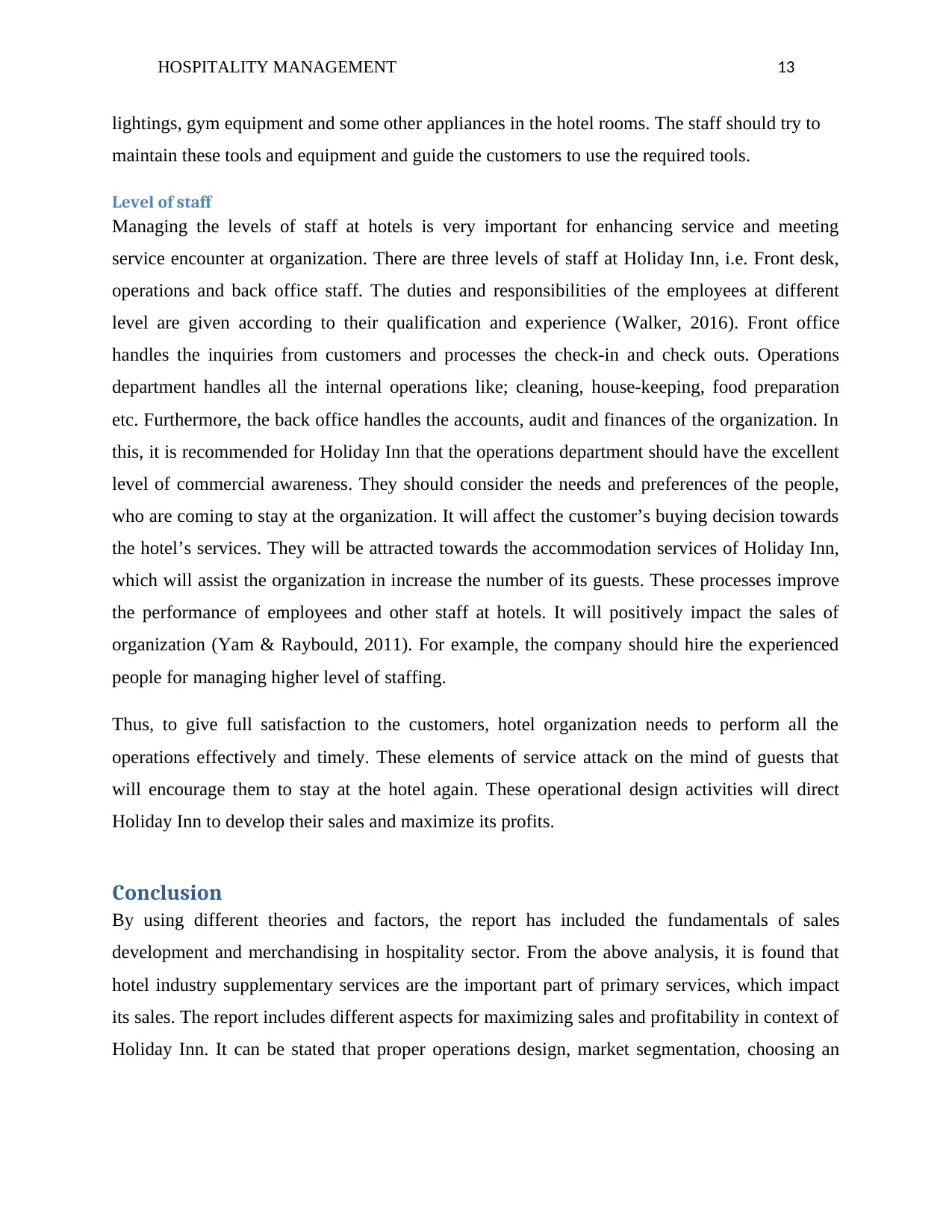
HOSPITALITY MANAGEMENT 13
lightings, gym equipment and some other appliances in the hotel rooms. The staff should try to
maintain these tools and equipment and guide the customers to use the required tools.
Level of staff
Managing the levels of staff at hotels is very important for enhancing service and meeting
service encounter at organization. There are three levels of staff at Holiday Inn, i.e. Front desk,
operations and back office staff. The duties and responsibilities of the employees at different
level are given according to their qualification and experience (Walker, 2016). Front office
handles the inquiries from customers and processes the check-in and check outs. Operations
department handles all the internal operations like; cleaning, house-keeping, food preparation
etc. Furthermore, the back office handles the accounts, audit and finances of the organization. In
this, it is recommended for Holiday Inn that the operations department should have the excellent
level of commercial awareness. They should consider the needs and preferences of the people,
who are coming to stay at the organization. It will affect the customer’s buying decision towards
the hotel’s services. They will be attracted towards the accommodation services of Holiday Inn,
which will assist the organization in increase the number of its guests. These processes improve
the performance of employees and other staff at hotels. It will positively impact the sales of
organization (Yam & Raybould, 2011). For example, the company should hire the experienced
people for managing higher level of staffing.
Thus, to give full satisfaction to the customers, hotel organization needs to perform all the
operations effectively and timely. These elements of service attack on the mind of guests that
will encourage them to stay at the hotel again. These operational design activities will direct
Holiday Inn to develop their sales and maximize its profits.
Conclusion
By using different theories and factors, the report has included the fundamentals of sales
development and merchandising in hospitality sector. From the above analysis, it is found that
hotel industry supplementary services are the important part of primary services, which impact
its sales. The report includes different aspects for maximizing sales and profitability in context of
Holiday Inn. It can be stated that proper operations design, market segmentation, choosing an
lightings, gym equipment and some other appliances in the hotel rooms. The staff should try to
maintain these tools and equipment and guide the customers to use the required tools.
Level of staff
Managing the levels of staff at hotels is very important for enhancing service and meeting
service encounter at organization. There are three levels of staff at Holiday Inn, i.e. Front desk,
operations and back office staff. The duties and responsibilities of the employees at different
level are given according to their qualification and experience (Walker, 2016). Front office
handles the inquiries from customers and processes the check-in and check outs. Operations
department handles all the internal operations like; cleaning, house-keeping, food preparation
etc. Furthermore, the back office handles the accounts, audit and finances of the organization. In
this, it is recommended for Holiday Inn that the operations department should have the excellent
level of commercial awareness. They should consider the needs and preferences of the people,
who are coming to stay at the organization. It will affect the customer’s buying decision towards
the hotel’s services. They will be attracted towards the accommodation services of Holiday Inn,
which will assist the organization in increase the number of its guests. These processes improve
the performance of employees and other staff at hotels. It will positively impact the sales of
organization (Yam & Raybould, 2011). For example, the company should hire the experienced
people for managing higher level of staffing.
Thus, to give full satisfaction to the customers, hotel organization needs to perform all the
operations effectively and timely. These elements of service attack on the mind of guests that
will encourage them to stay at the hotel again. These operational design activities will direct
Holiday Inn to develop their sales and maximize its profits.
Conclusion
By using different theories and factors, the report has included the fundamentals of sales
development and merchandising in hospitality sector. From the above analysis, it is found that
hotel industry supplementary services are the important part of primary services, which impact
its sales. The report includes different aspects for maximizing sales and profitability in context of
Holiday Inn. It can be stated that proper operations design, market segmentation, choosing an
Paraphrase This Document
Need a fresh take? Get an instant paraphrase of this document with our AI Paraphraser
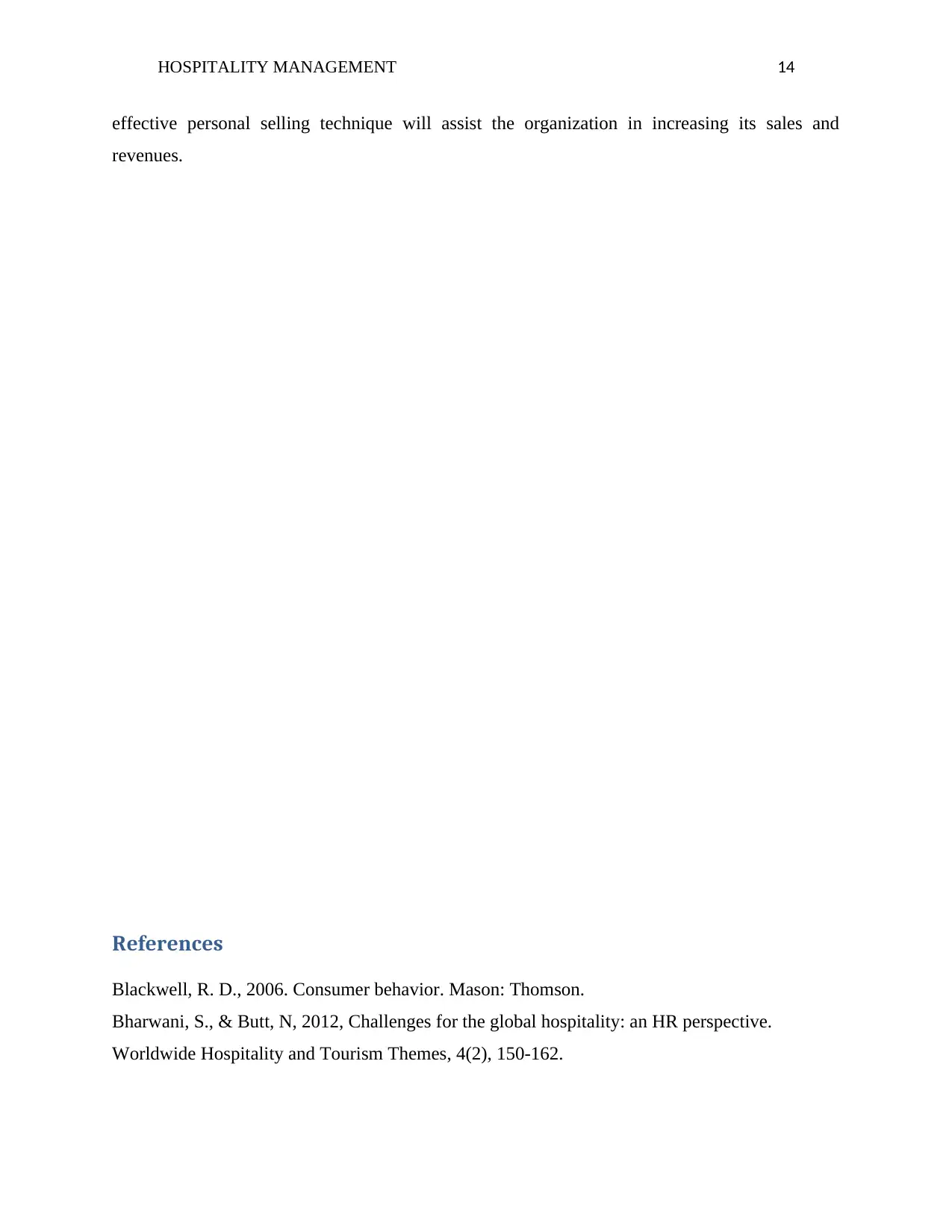
HOSPITALITY MANAGEMENT 14
effective personal selling technique will assist the organization in increasing its sales and
revenues.
References
Blackwell, R. D., 2006. Consumer behavior. Mason: Thomson.
Bharwani, S., & Butt, N, 2012, Challenges for the global hospitality: an HR perspective.
Worldwide Hospitality and Tourism Themes, 4(2), 150-162.
effective personal selling technique will assist the organization in increasing its sales and
revenues.
References
Blackwell, R. D., 2006. Consumer behavior. Mason: Thomson.
Bharwani, S., & Butt, N, 2012, Challenges for the global hospitality: an HR perspective.
Worldwide Hospitality and Tourism Themes, 4(2), 150-162.
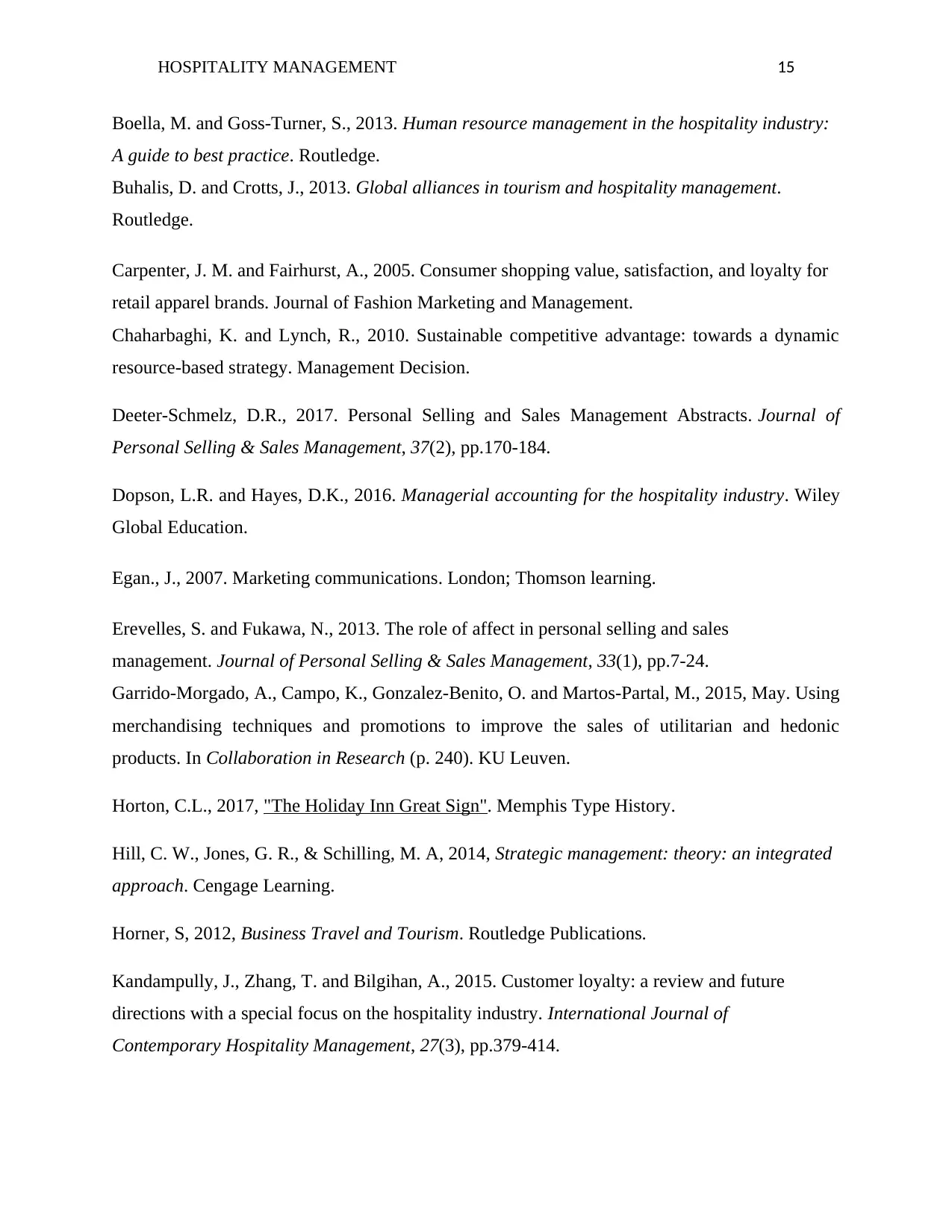
HOSPITALITY MANAGEMENT 15
Boella, M. and Goss-Turner, S., 2013. Human resource management in the hospitality industry:
A guide to best practice. Routledge.
Buhalis, D. and Crotts, J., 2013. Global alliances in tourism and hospitality management.
Routledge.
Carpenter, J. M. and Fairhurst, A., 2005. Consumer shopping value, satisfaction, and loyalty for
retail apparel brands. Journal of Fashion Marketing and Management.
Chaharbaghi, K. and Lynch, R., 2010. Sustainable competitive advantage: towards a dynamic
resource-based strategy. Management Decision.
Deeter-Schmelz, D.R., 2017. Personal Selling and Sales Management Abstracts. Journal of
Personal Selling & Sales Management, 37(2), pp.170-184.
Dopson, L.R. and Hayes, D.K., 2016. Managerial accounting for the hospitality industry. Wiley
Global Education.
Egan., J., 2007. Marketing communications. London; Thomson learning.
Erevelles, S. and Fukawa, N., 2013. The role of affect in personal selling and sales
management. Journal of Personal Selling & Sales Management, 33(1), pp.7-24.
Garrido-Morgado, A., Campo, K., Gonzalez-Benito, O. and Martos-Partal, M., 2015, May. Using
merchandising techniques and promotions to improve the sales of utilitarian and hedonic
products. In Collaboration in Research (p. 240). KU Leuven.
Horton, C.L., 2017, "The Holiday Inn Great Sign". Memphis Type History.
Hill, C. W., Jones, G. R., & Schilling, M. A, 2014, Strategic management: theory: an integrated
approach. Cengage Learning.
Horner, S, 2012, Business Travel and Tourism. Routledge Publications.
Kandampully, J., Zhang, T. and Bilgihan, A., 2015. Customer loyalty: a review and future
directions with a special focus on the hospitality industry. International Journal of
Contemporary Hospitality Management, 27(3), pp.379-414.
Boella, M. and Goss-Turner, S., 2013. Human resource management in the hospitality industry:
A guide to best practice. Routledge.
Buhalis, D. and Crotts, J., 2013. Global alliances in tourism and hospitality management.
Routledge.
Carpenter, J. M. and Fairhurst, A., 2005. Consumer shopping value, satisfaction, and loyalty for
retail apparel brands. Journal of Fashion Marketing and Management.
Chaharbaghi, K. and Lynch, R., 2010. Sustainable competitive advantage: towards a dynamic
resource-based strategy. Management Decision.
Deeter-Schmelz, D.R., 2017. Personal Selling and Sales Management Abstracts. Journal of
Personal Selling & Sales Management, 37(2), pp.170-184.
Dopson, L.R. and Hayes, D.K., 2016. Managerial accounting for the hospitality industry. Wiley
Global Education.
Egan., J., 2007. Marketing communications. London; Thomson learning.
Erevelles, S. and Fukawa, N., 2013. The role of affect in personal selling and sales
management. Journal of Personal Selling & Sales Management, 33(1), pp.7-24.
Garrido-Morgado, A., Campo, K., Gonzalez-Benito, O. and Martos-Partal, M., 2015, May. Using
merchandising techniques and promotions to improve the sales of utilitarian and hedonic
products. In Collaboration in Research (p. 240). KU Leuven.
Horton, C.L., 2017, "The Holiday Inn Great Sign". Memphis Type History.
Hill, C. W., Jones, G. R., & Schilling, M. A, 2014, Strategic management: theory: an integrated
approach. Cengage Learning.
Horner, S, 2012, Business Travel and Tourism. Routledge Publications.
Kandampully, J., Zhang, T. and Bilgihan, A., 2015. Customer loyalty: a review and future
directions with a special focus on the hospitality industry. International Journal of
Contemporary Hospitality Management, 27(3), pp.379-414.
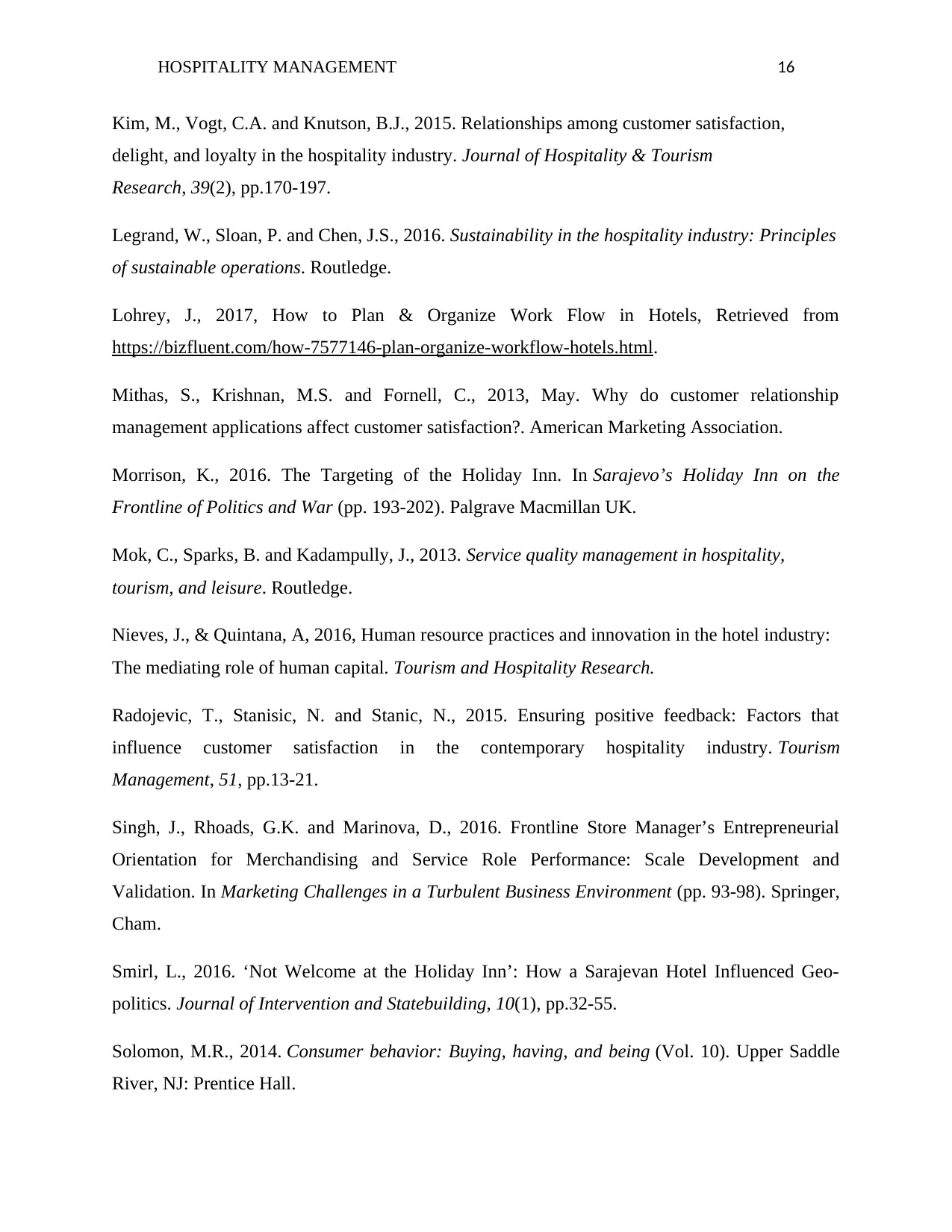
HOSPITALITY MANAGEMENT 16
Kim, M., Vogt, C.A. and Knutson, B.J., 2015. Relationships among customer satisfaction,
delight, and loyalty in the hospitality industry. Journal of Hospitality & Tourism
Research, 39(2), pp.170-197.
Legrand, W., Sloan, P. and Chen, J.S., 2016. Sustainability in the hospitality industry: Principles
of sustainable operations. Routledge.
Lohrey, J., 2017, How to Plan & Organize Work Flow in Hotels, Retrieved from
https://bizfluent.com/how-7577146-plan-organize-workflow-hotels.html.
Mithas, S., Krishnan, M.S. and Fornell, C., 2013, May. Why do customer relationship
management applications affect customer satisfaction?. American Marketing Association.
Morrison, K., 2016. The Targeting of the Holiday Inn. In Sarajevo’s Holiday Inn on the
Frontline of Politics and War (pp. 193-202). Palgrave Macmillan UK.
Mok, C., Sparks, B. and Kadampully, J., 2013. Service quality management in hospitality,
tourism, and leisure. Routledge.
Nieves, J., & Quintana, A, 2016, Human resource practices and innovation in the hotel industry:
The mediating role of human capital. Tourism and Hospitality Research.
Radojevic, T., Stanisic, N. and Stanic, N., 2015. Ensuring positive feedback: Factors that
influence customer satisfaction in the contemporary hospitality industry. Tourism
Management, 51, pp.13-21.
Singh, J., Rhoads, G.K. and Marinova, D., 2016. Frontline Store Manager’s Entrepreneurial
Orientation for Merchandising and Service Role Performance: Scale Development and
Validation. In Marketing Challenges in a Turbulent Business Environment (pp. 93-98). Springer,
Cham.
Smirl, L., 2016. ‘Not Welcome at the Holiday Inn’: How a Sarajevan Hotel Influenced Geo-
politics. Journal of Intervention and Statebuilding, 10(1), pp.32-55.
Solomon, M.R., 2014. Consumer behavior: Buying, having, and being (Vol. 10). Upper Saddle
River, NJ: Prentice Hall.
Kim, M., Vogt, C.A. and Knutson, B.J., 2015. Relationships among customer satisfaction,
delight, and loyalty in the hospitality industry. Journal of Hospitality & Tourism
Research, 39(2), pp.170-197.
Legrand, W., Sloan, P. and Chen, J.S., 2016. Sustainability in the hospitality industry: Principles
of sustainable operations. Routledge.
Lohrey, J., 2017, How to Plan & Organize Work Flow in Hotels, Retrieved from
https://bizfluent.com/how-7577146-plan-organize-workflow-hotels.html.
Mithas, S., Krishnan, M.S. and Fornell, C., 2013, May. Why do customer relationship
management applications affect customer satisfaction?. American Marketing Association.
Morrison, K., 2016. The Targeting of the Holiday Inn. In Sarajevo’s Holiday Inn on the
Frontline of Politics and War (pp. 193-202). Palgrave Macmillan UK.
Mok, C., Sparks, B. and Kadampully, J., 2013. Service quality management in hospitality,
tourism, and leisure. Routledge.
Nieves, J., & Quintana, A, 2016, Human resource practices and innovation in the hotel industry:
The mediating role of human capital. Tourism and Hospitality Research.
Radojevic, T., Stanisic, N. and Stanic, N., 2015. Ensuring positive feedback: Factors that
influence customer satisfaction in the contemporary hospitality industry. Tourism
Management, 51, pp.13-21.
Singh, J., Rhoads, G.K. and Marinova, D., 2016. Frontline Store Manager’s Entrepreneurial
Orientation for Merchandising and Service Role Performance: Scale Development and
Validation. In Marketing Challenges in a Turbulent Business Environment (pp. 93-98). Springer,
Cham.
Smirl, L., 2016. ‘Not Welcome at the Holiday Inn’: How a Sarajevan Hotel Influenced Geo-
politics. Journal of Intervention and Statebuilding, 10(1), pp.32-55.
Solomon, M.R., 2014. Consumer behavior: Buying, having, and being (Vol. 10). Upper Saddle
River, NJ: Prentice Hall.
Secure Best Marks with AI Grader
Need help grading? Try our AI Grader for instant feedback on your assignments.
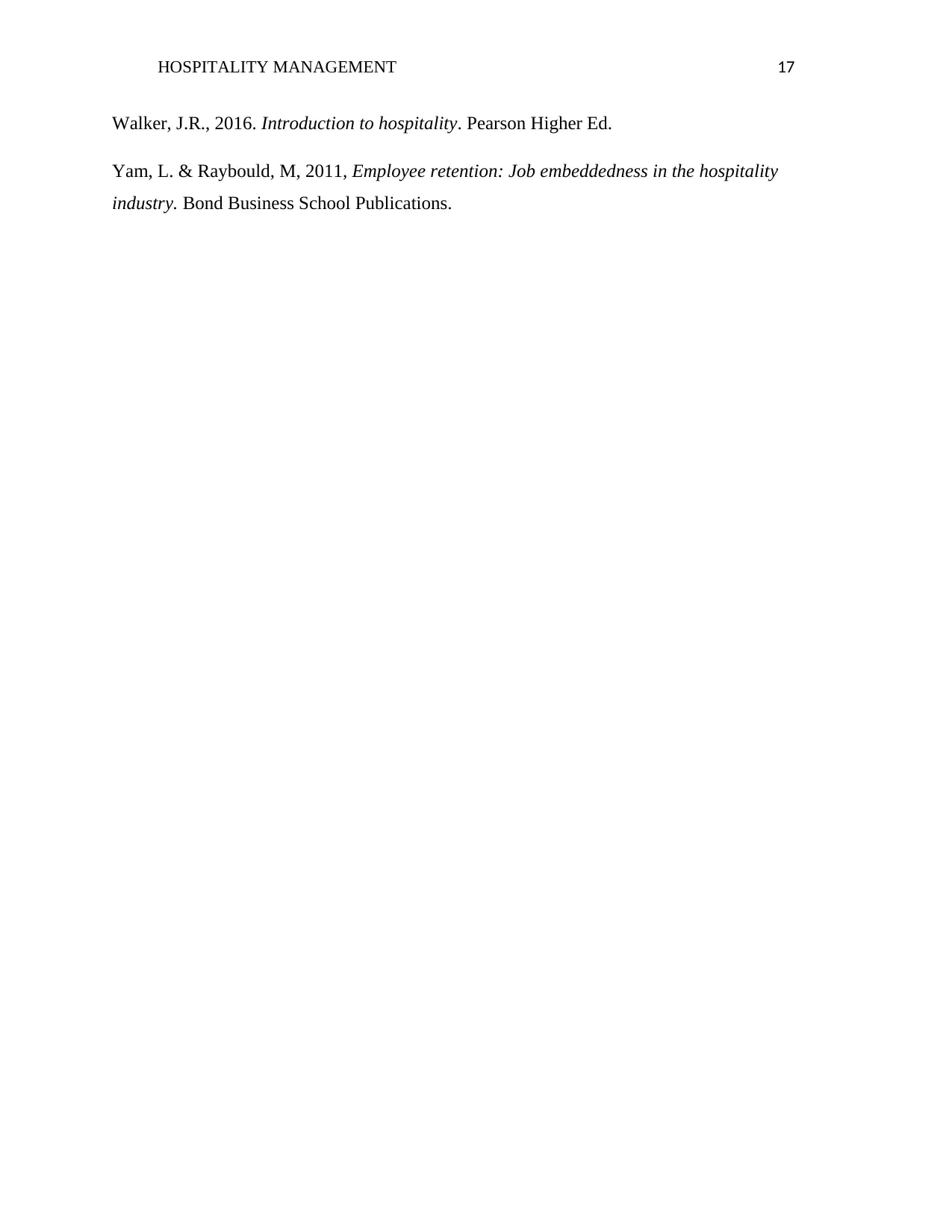
HOSPITALITY MANAGEMENT 17
Walker, J.R., 2016. Introduction to hospitality. Pearson Higher Ed.
Yam, L. & Raybould, M, 2011, Employee retention: Job embeddedness in the hospitality
industry. Bond Business School Publications.
Walker, J.R., 2016. Introduction to hospitality. Pearson Higher Ed.
Yam, L. & Raybould, M, 2011, Employee retention: Job embeddedness in the hospitality
industry. Bond Business School Publications.
1 out of 17
Related Documents
Your All-in-One AI-Powered Toolkit for Academic Success.
+13062052269
info@desklib.com
Available 24*7 on WhatsApp / Email
![[object Object]](/_next/static/media/star-bottom.7253800d.svg)
Unlock your academic potential
© 2024 | Zucol Services PVT LTD | All rights reserved.





